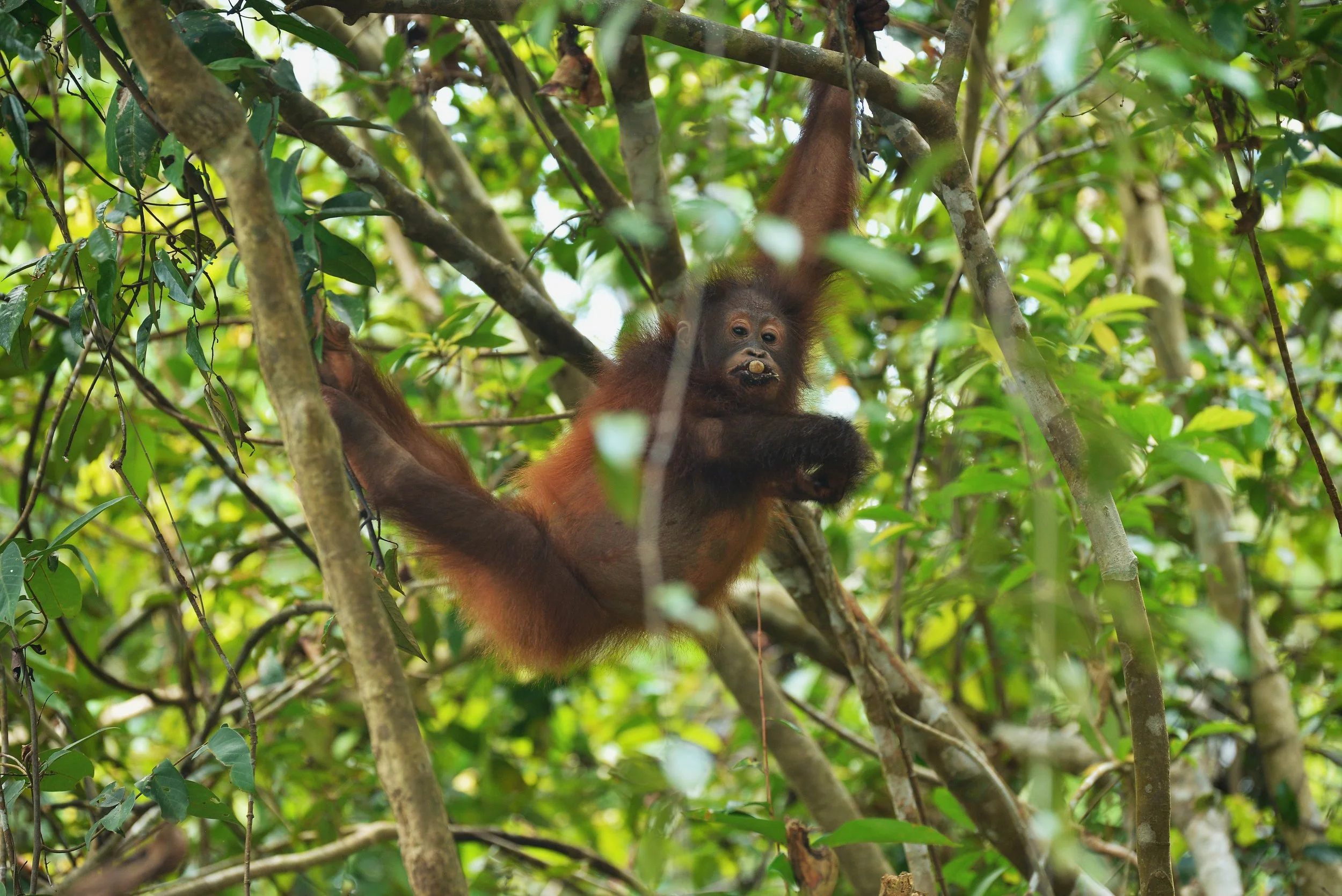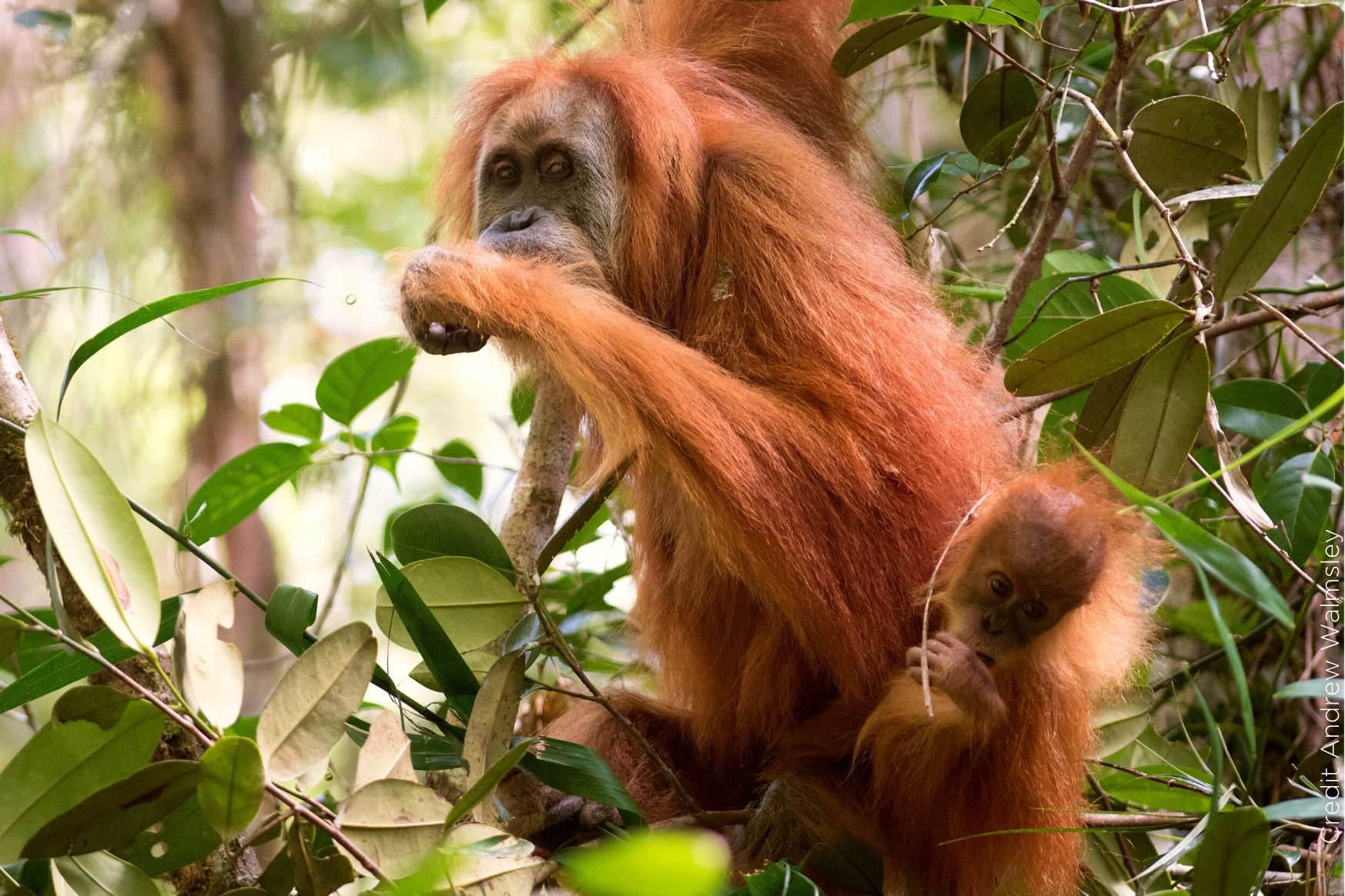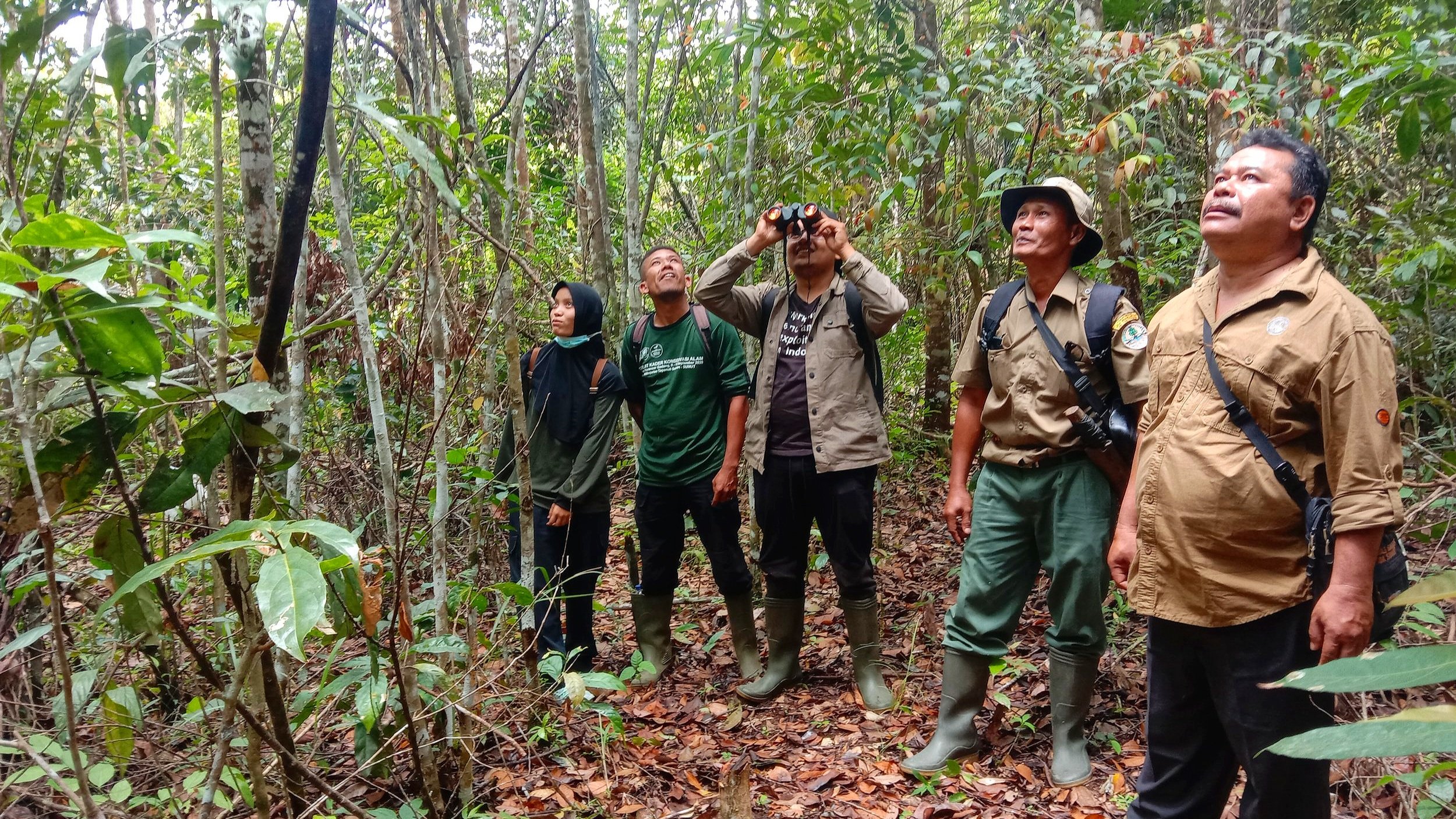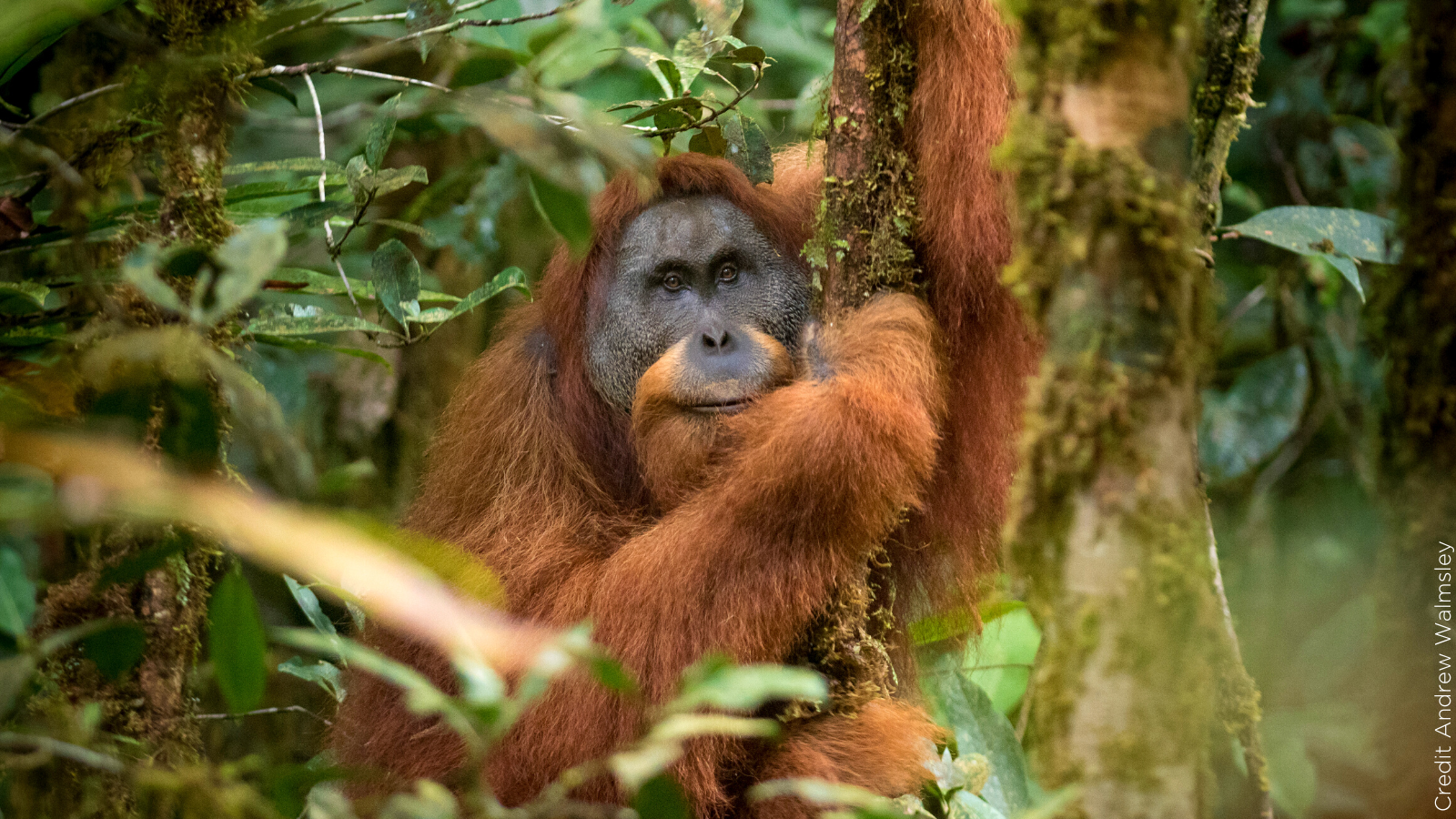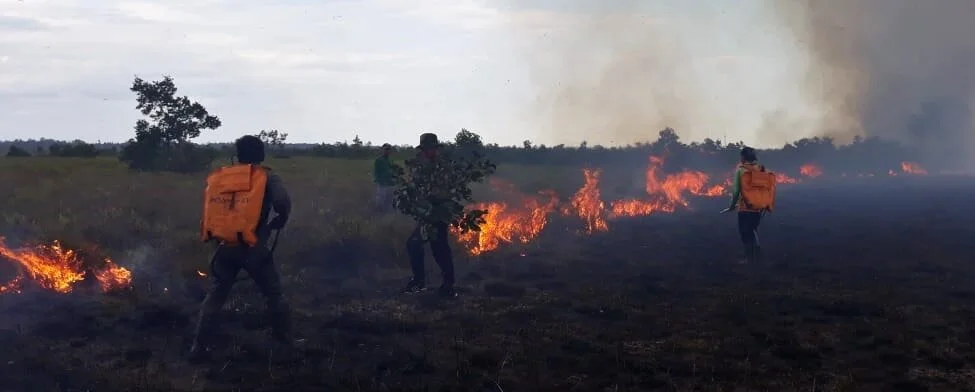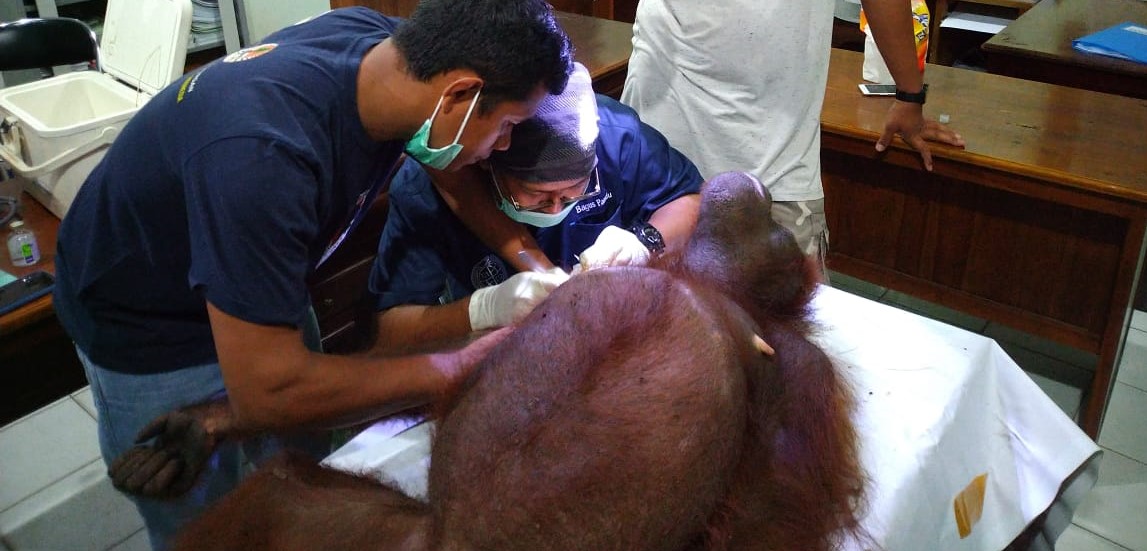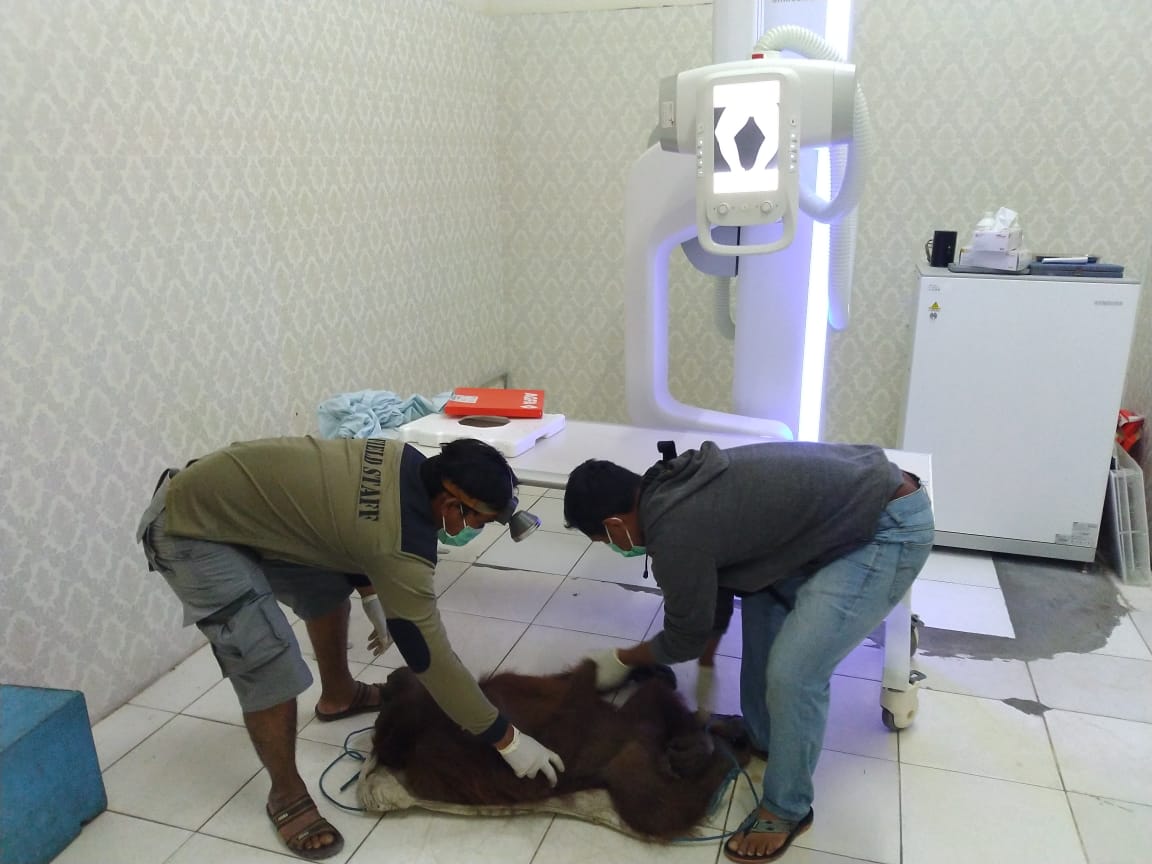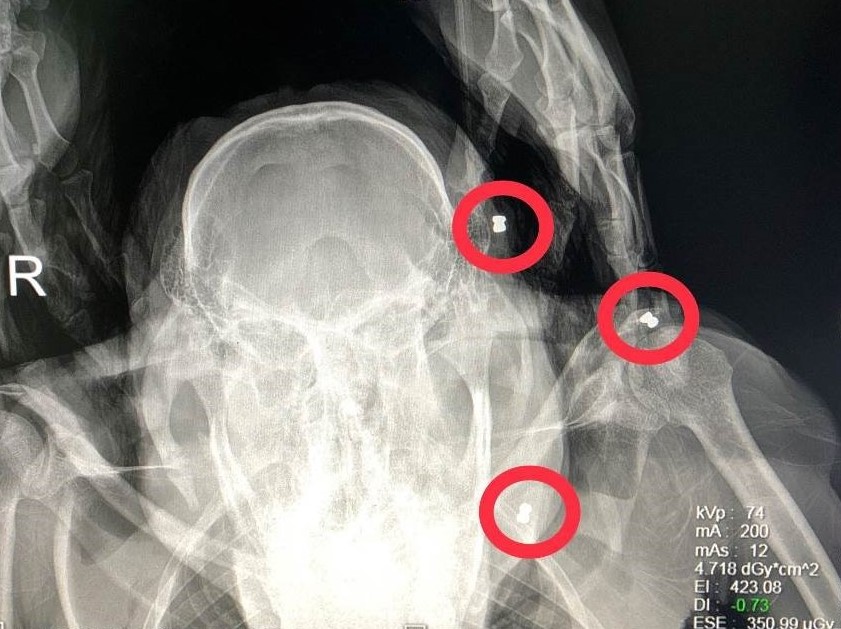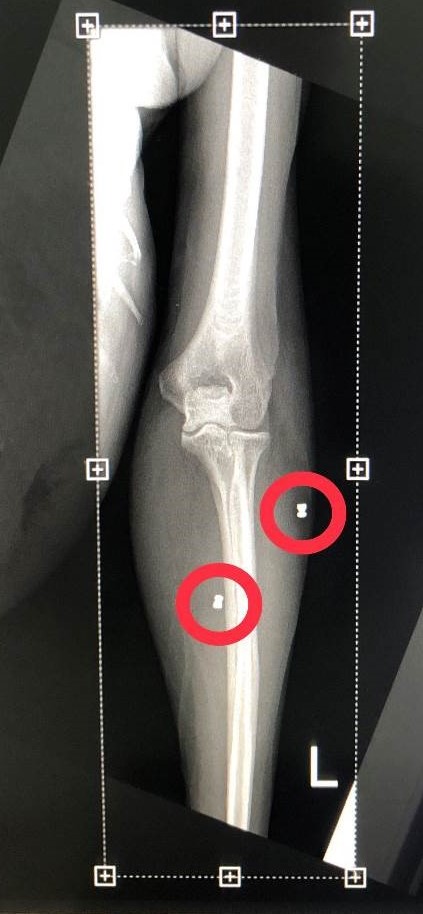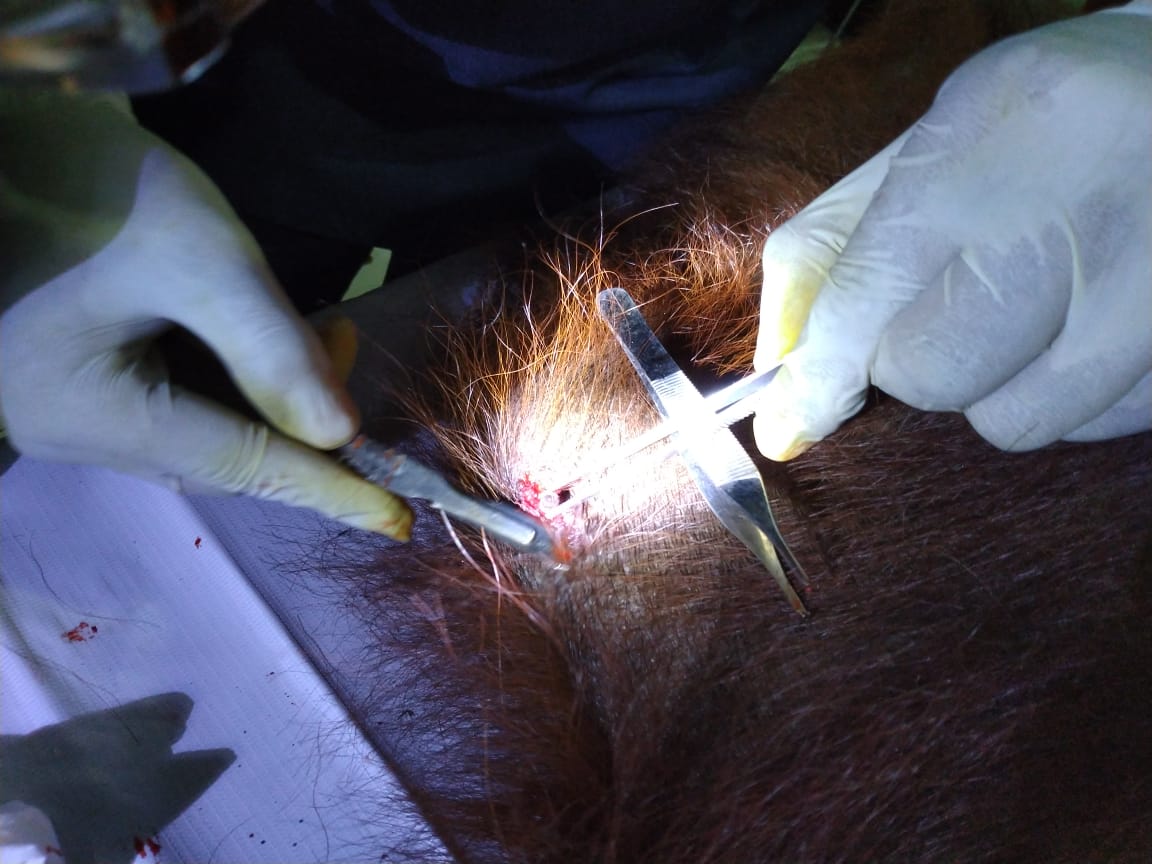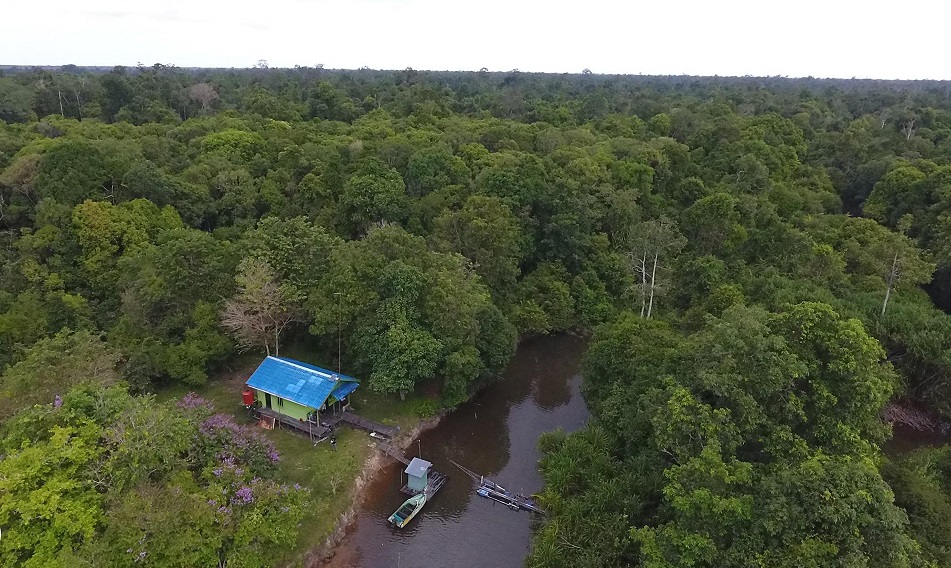Orangutans consume a variety of food from the forest to support their large size. Being arboreal species gives them access to the food they need to sustain their body size.
Saving the most endangered great ape - the Tapanuli orangutan
With only 800 individuals remaining in the wild, the Tapanuli orangutan is the rarest species of great ape. Their home in the mountainous forest of Batang Toru, Northern Sumatra, spans around 250,000 acres but is heavily fragmented due to habitat loss. Consequently, this means that the Tapanuli orangutan is also the most vulnerable of the great apes to become extinct.
We’re determined to provide a future for all orangutans, but as the Tapanuli’s forest is located far from our local programmes in Central Kalimantan, Indonesian Borneo, we’ve called upon a dedicated team who can help us.
Scorpion - The Wildlife Trade Monitoring Group, are a local NGO in Sumatra whose primary focus is to tackle animal exploitation by working with government and nearby communities. As their main goals match those of Orangutan Foundation, we could think of no one better suited to help us ensure a safer future for the Tapanuli orangutan, and here are three successful approaches that they use to do this:
1) Patrols. With the help of local law enforcement, patrol teams regularly visit 11 sites in the Batang Toru region which are orangutan habitats or areas of suspected illegal activity. It can be daunting prospect to explore a remote patch of rainforest which may harbour illegal loggers, miners, or wildlife traffickers, but it’s a necessary task to deter such destructive activity.
So far the team have caught illegal loggers felling trees for timber, reported man-made shelters in the forest which are likely used by hunters, and even uncovered patches of forest within nature reserves that have been cleared to make way for illegal plantations. All destructive behaviours which if left unfound, would destroy vast areas of orangutan habitat.
2) Investigations. As a result of these patrols, and by cooperating with local communities and government, the team can investigate these offenses further to thwart more habitat encroachment.
In some cases they have been able to identify names of loggers and ensure that previously used camps within protected areas have been abandoned. These surveys are ongoing, but to date have ensured that a dozen or so sites of illegal activity are no longer used.
3) Awareness. It’s paramount that we spread the word and remind local communities that their surrounding forests are essential for Tapanuli orangutans, and this has been communicated in a number of ways in the Batang Toru region.
Agriculture is the primary livelihood for many local people so instructive talks and discussions have helped encourage nearby villages to reduce the spread of their farmland into protected areas. Interestingly, the team have also incorporated the message into Friday prayers in mosques and Sunday sermons in churches to emphasise the matter and raise awareness to over 300 villagers. This is a unique approach but one that is proving to have a positive impact on the local perception of orangutans and their forests.
Despite major difficulties from the emergence of the global pandemic, the Scorpion team have worked wonders to protect the Batang Toru ecosystem. Through our partnership so far the team have helped strengthen over 15,000 hectares of strict conservation area, providing a safer forest for Tapanuli orangutans and encouraging better relations with local people for the future. From their findings it’s clear that habitat loss and encroachment will continue to be a major hurdle, but there are at least effective ways of resolving this with the right support.
Fires burn as the dry season continues
As the UK Summer fades into Autumn, in Indonesia, the dry season is still in full swing. Dry conditions have created an environment that enables fires to spread quickly across the land, and as reported extensively in the media, recent fires across South East Asia have contributed to a blanket of haze that currently hovers over much of the subcontinent.
These fires are often the result of traditional farming methods. Towards the end of a dry season, farmers in this part of the world will routinely use a slash and burn agricultural technique to clear their land and provide better conditions for crop regeneration. Local communities may also use this method in order to create clearings so that they can hunt for deer or wild boar, however in particularly dry years, these fires can burn out of control for prolonged periods of time and contribute to the levels of haze that have been reported in recent weeks.
The Lamandau Wildlife Reserve in Indonesian Borneo is an area of forest protected by Orangutan Foundation, but it’s western region has been subject to fires during this dry spell which can creep into the reserve. Our field teams and guard post staff have worked with locals officials on occasion into the night to battle the flames and stop the spreading. They continue to be on high alert for any potential fires before the much-needed rains come, but we are indebted to their efforts in protecting this vital wildlife refuge.
Fortunately this reserve and the significant orangutan population in it’s interior are under protection from skilled government and Orangutan Foundation staff who are trained and equipped to prevent outbreaks of fire, however their operations would not be possible without ongoing support. To become a Guardian of the Lamandau and help protect this ecologically rich environment all year round, please support our work by exploring the link below.
Orangutans rescued from oil palm plantation marks International Orangutan Day
While people around the world celebrated the red ape this week, our team have had a busy few days spent rescuing orangutans in need. To go behind the scenes and understand some of the challenges still facing orangutans, our team in the field have put together a timeline of our most recent orangutan rescue:
Friday morning- It was reported to government officers this week that an orangutan had been spotted within a community oil palm plantation in Central Kalimantan, Indonesian Borneo. Once the location had been determined, our orangutan rescue team were then called upon to assist.
Friday 11:45am - On arrival, a female orangutan was observed with an infant in an isolated copse of trees, entirely surrounded by oil palm plantation. With the dimensions of this tiny patch of fragmented forest being a mere 10x20 metre area, and any suitable nearby forest considered too far away for the pair to travel, a decision was made to rescue them from this remote island of trees for their safety. In practice however, the strong winds and height of the trees made tranquilising the female a very difficult task, and it wasn’t until several hours later that the pair were finally safely brought down from the canopy.
Friday 6pm - With the light beginning to fade, and the female orangutan under sedation, it was the role of the veterinary team to perform a quick physical examination to check the health of the pair. Under initial inspection, it was observed that they were in relatively good health except the mother had several air rifle pellets embedded in her skin, and therefore required further attention. As the night drew closer, the pair were then carefully transported to a temporary facility for them to rest.
Sunday evening - In honour of Indonesian Independence Day on the Friday, the 16-year-old female orangutan had been called Augustine, and her young, who had been identified as a 2 or 3-year-old male, named Augusta. They had both rested and recuperated from their rescue, and now our team were required to act fast to try and observe the number and severity of Augustine’s gun pellet injuries.
Sunday 9pm - In order to monitor the number and location of the bullets in Augustine’s skin, she was taken along with Augusta to a nearby public hospital so that she could be X-rayed. After being safely anesthetised, she was found to have 7 air rifle pellets lodged in her skin.
Sunday 10:15pm - It was at this point that our veterinary team, alongside government officials, began the minor surgical procedure of removing as many bullets as possible from Augustine. The delicate operation was able to remove 5 of the pellets, with a further 2 too deeply embedded into her tissue to be able to safely extract. Fortunately, Augustine appeared to come out of the hour and 15 minute procedure in good health.
Monday 2pm - As the previous evening’s medical procedure had run so smoothly, the following day after a final check-up from our team, Augustine and Augusta were given the all clear to be released back into the wild. A safe area within the Lamandau Wildlife Reserve was selected as an ideal relocation site as this region is protected by Orangutan Foundation guard posts, and after a short boat ride, the pair were happily released into the forest. Once their transport cage was opened, our team were able to catch a quick glimpse of the orangutans before climbing into the nearby trees.
It’s encouraging to know that Augustine and Augusta will now be able to thrive in their new protected habitat. However, witnessing these orangutans initially stranded in the last remaining forest due to habitat loss, shows hows orangutans remain under threat and that the work of the Orangutan Foundation is still needed.
To find out how you can become a Guardian of Lamandau and protect Augustine and Augusta’s new home, please explore our website.
How guard posts play a crucial role in orangutan conservation
At the Orangutan Foundation, two main areas of orangutan forest habitat where we work are Tanjung Puting National Park and the Lamandau Wildlife Reserve in Indonesian Borneo. Together they cover over half a million acres of forest- almost twice the size of Hong Kong. It’s therefore essential that the Foundation’s guard post teams are skilled and well trained to monitor the forest and waterways within this vast area.
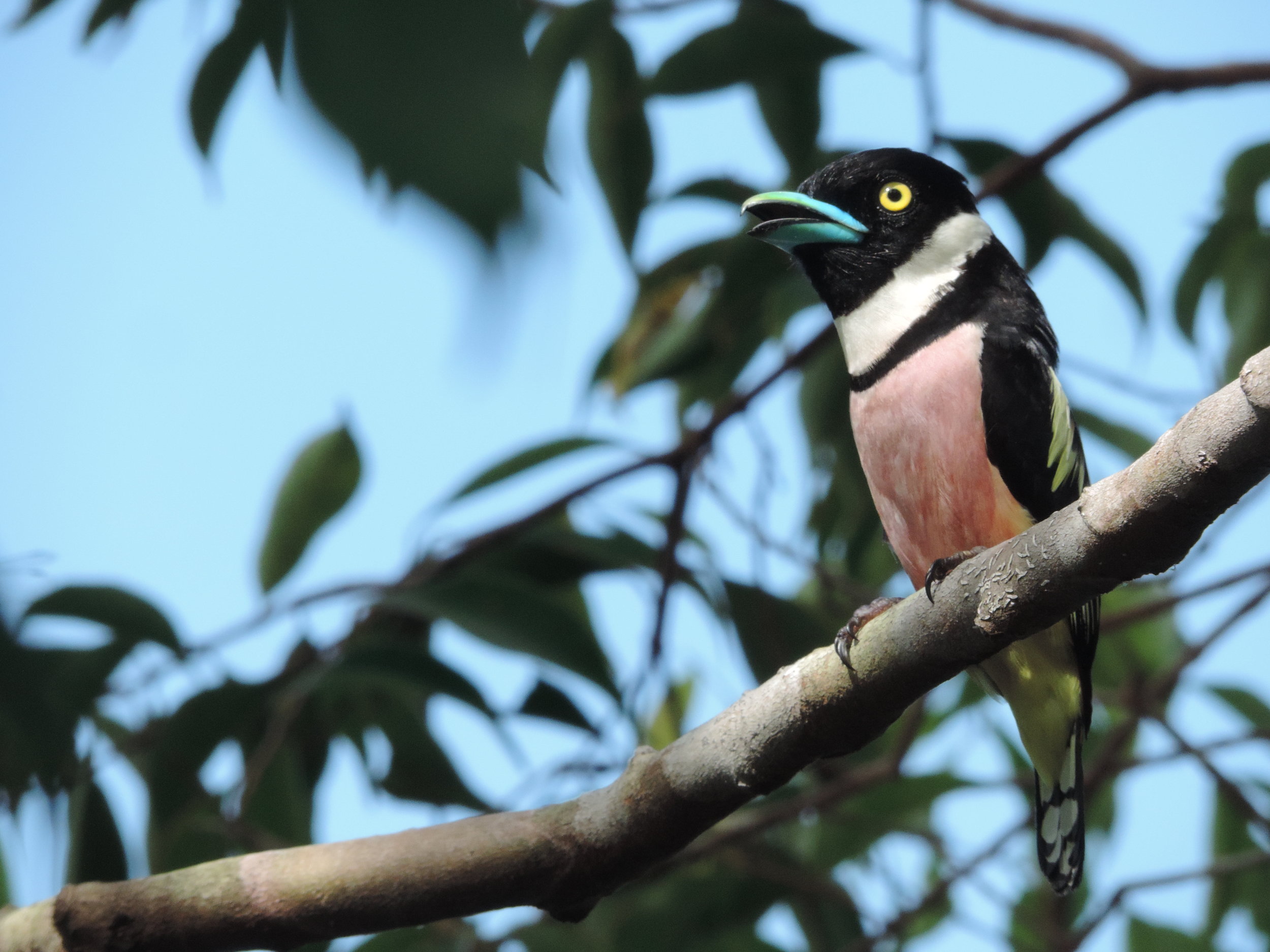
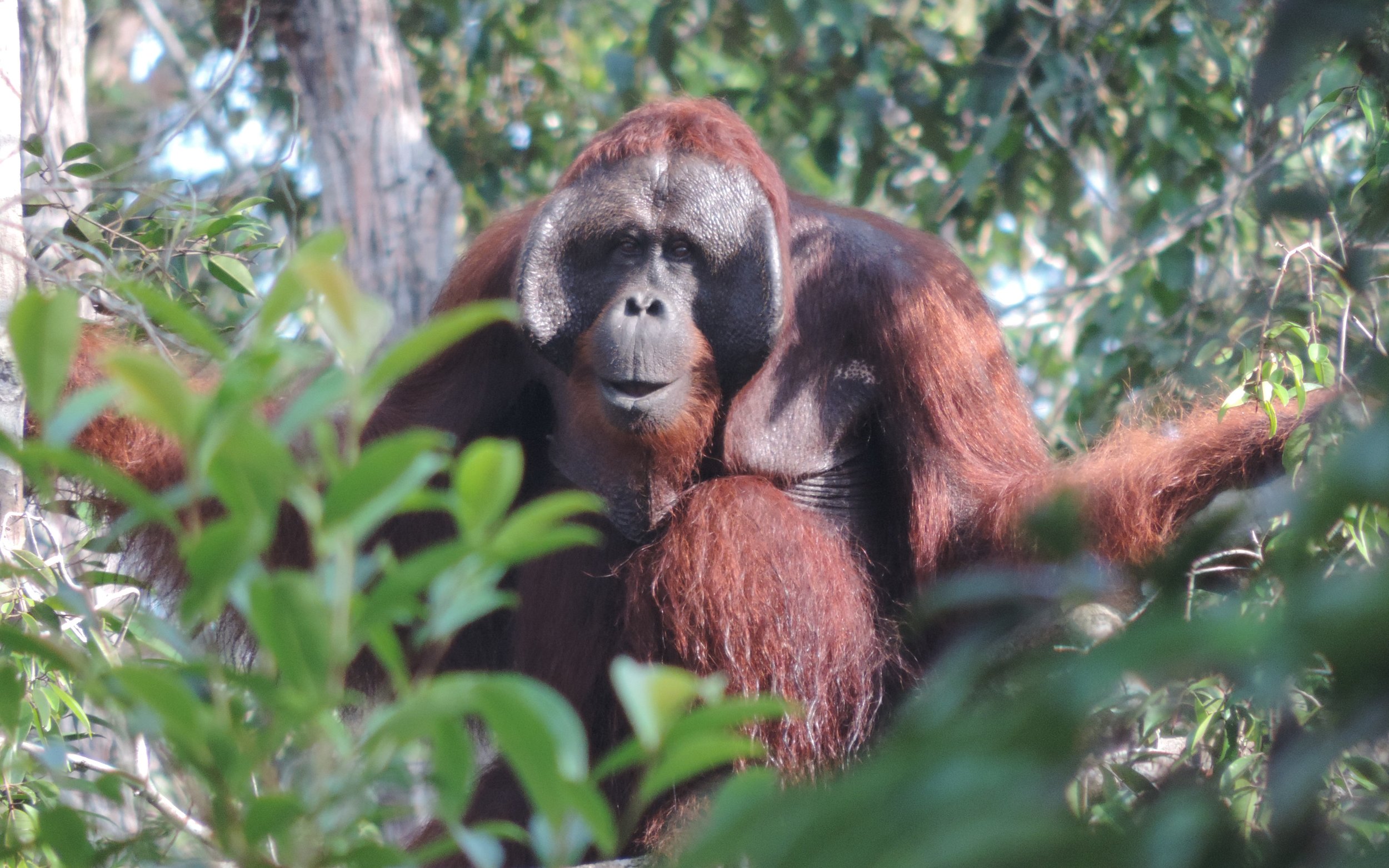
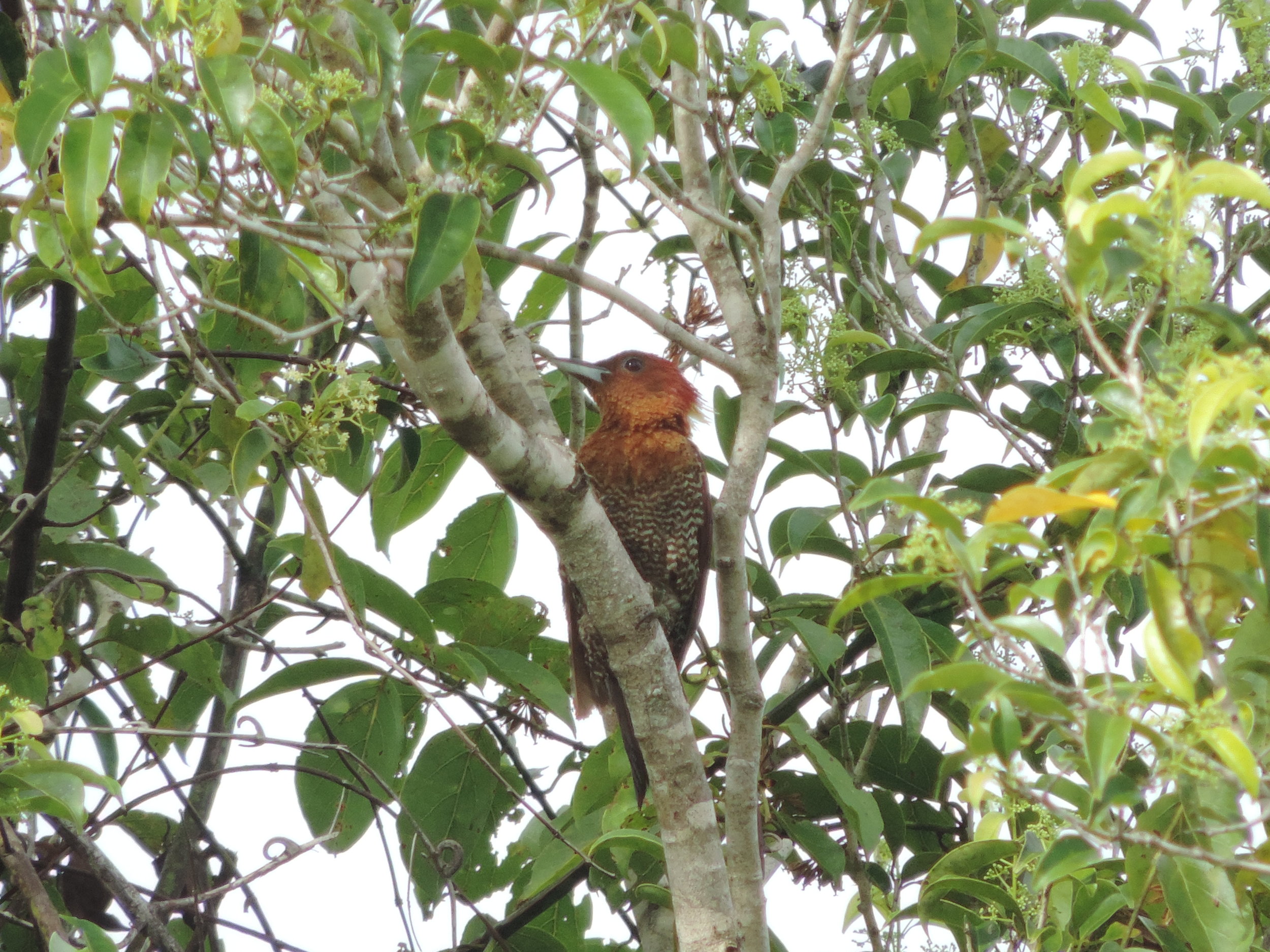
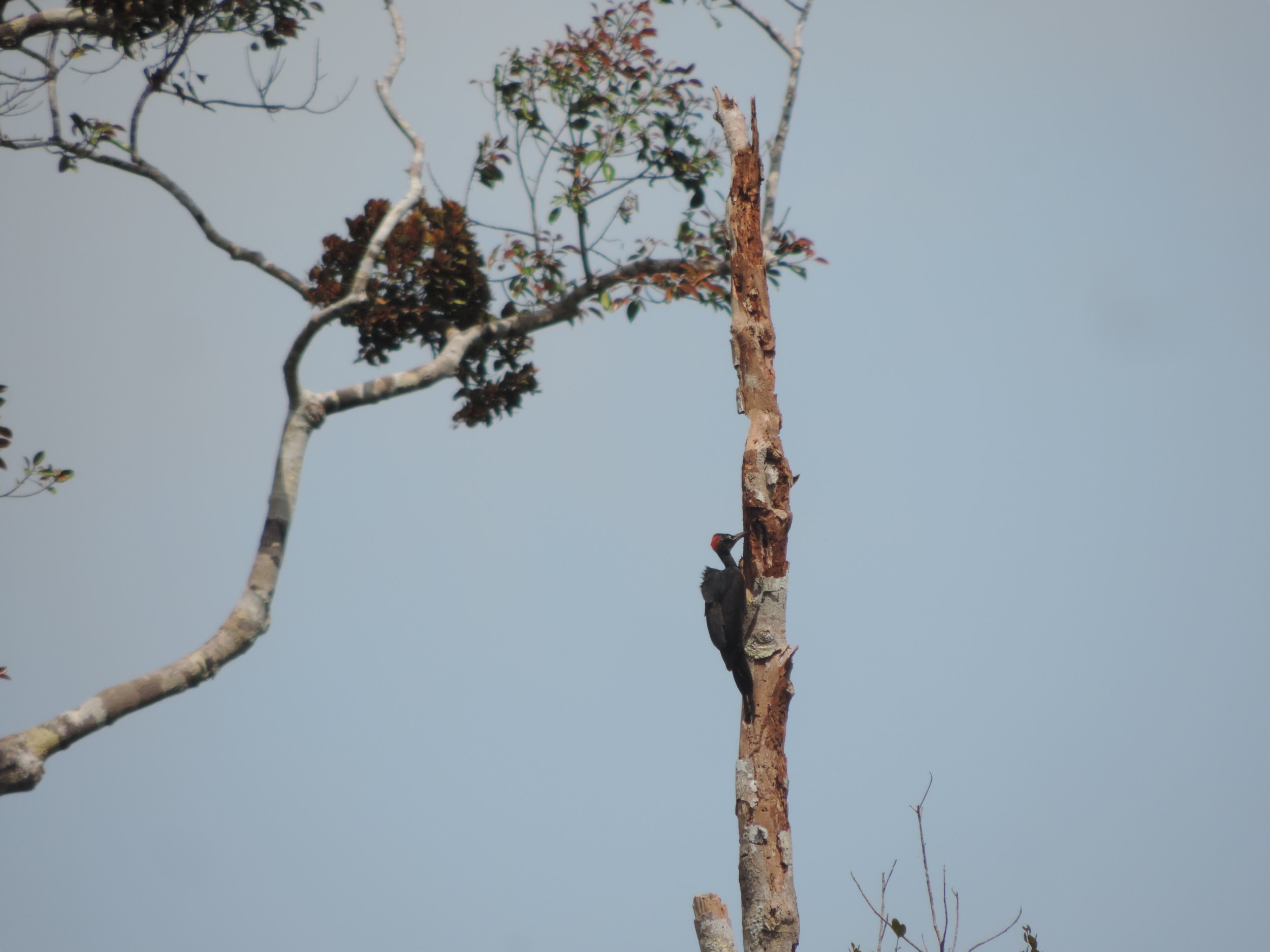
During regular patrols, the team record wildlife sightings like these recent images from Tanjung Puting National Park.
Habitat loss is the largest threat to orangutan populations today; for example, it is predicted that by 2080, between 70-80% of prime orangutan habitat will be lost in Borneo alone if current trends continue. The role of guard posts as a deterrent therefore is vital to ensure intruders do not encroach or enter these parks illegally, damaging or degrading the environment which is essential for orangutans and other wildlife.
Fire fighting is another important role in the field that make these outpost sites so vital. Each one is prepared with fire fighting equipment, and the Foundation works closely with training and supporting the team to be vigilant in spotting forest fires and then safely extinguishing them with as little damage to the habitat as possible. These fires are a potential threat year on year, in 2015 for example an area the size of Wales was lost to forest fires alone in Indonesia, so to have our team patrolling these sites is of paramount importance to orangutan protection and the surrounding area.
We are incredibly grateful to have such a skilled and hardworking team here at the Orangutan Foundation, but they still require support. Find out how you can help from as little as £2.
Two rescued orangutans returned to the wild
Two critically endangered orangutans are now back in the wild, where they belong, thanks to the dedicated work of the Orangutan Foundation’s team and the Natural Resources Conservancy Agency of Central Kalimantan (BKSDA).
Both orangutans were wild born but tragically ended up orphaned and rescued by Orangutan Foundation. Shifa was rescued from being kept as a pet in September 2016, when she was only 2-years-old. Panglima, was rescued at the end of March 2019, from community forest, he is thought to be about 5-years-old but showed extremely wild behaviour (read more about his rescue).
Shifa rescued in September 2016
Habitat loss is forcing wild orangutans into closer contact with humans. We can’t say for sure what happened to the mothers of Shifa and Panglima but it is most likely they were killed, because they were considered as pests. As an infant, Shifa would have been clinging to her mother and so she was taken to become a pet. Panglima, being older and more independent, must have been apart from his mother when she was killed.
Panglima rescue by Orangutan Foundation and Wildlife Department (BKSDA) Central Kalimantan
Shifa was taken to the 158,000-acre protected Lamandau Wildlife Reserve, Central Kalimantan, Indonesian Borneo. She lived at Camp Buluh, one of five post-release monitoring sites in the reserve, which she shared with another orphaned orangutan, Okto. The two young orangutans were great playmates and Okto helped Shifa to adjust to her new life.
Okto (left) and Shifa (right)
Shifa always displayed very wild instincts and, as she got older, these became stronger and more evident. Increasingly she would go off exploring the surrounding forest and was reluctant to return to her enclosure at night.
Shifa in her nest and increasingly reluctant to go back into her enclosure.
It was decided to release Shifa before she released herself! When an orangutan is fully released back to an independent life, Orangutan Foundation staff follow the individual for up to two weeks to ensure the orangutan is able to survive. Ashley Leiman OBE, Orangutan Foundation Founder and Director/Trustee, was present for the two releases and was encouraged to see how readily both orangutans clambered up into the trees to begin their new life.
As soon as the transport cage door opened, Shifa shot straight out and climbed up the nearest tree
Shifa and Panglima have had to overcome massive hurdles early on in their life. Our challenge now is to ensure the rest of their life is spent in the wild. We are doing this by safeguarding their globally important forest habitat in Lamandau Wildlife Reserve. Orangutan Foundation actively monitor the reserve with a network of guard posts and regular patrolling to prevent illegal activities from destroying the forests and harming wildlife.
Partnerships for Protection
Most people’s idea of orangutan conservation would evoke a picture of a life in the wild, tracking these charismatic apes through the forest, rescuing and releasing them into a sunlit canopy. While this is one element, the reality of our work is a much bigger picture.
Release of orangutan back into the wild
Orangutan conservation must address the complex issues affecting the wider landscape and habitat, and this involves an in-depth understanding of land management and negotiation with government, communities, and private sector stakeholders. It sometimes feels far from the animals in the forest, but it’s fundamental to their future survival.
This week, Orangutan Foundation and the Central Kalimantan Wildlife Department (BKSDA) held a workshop on Management of Wildlife in Protected Forest and Production Forest Areas and a Forum on Orangutans and Oil-Palm Plantations. There were more than 30 participants from parties including the Directorate of Biodiversity Conservation (KKH), Ditjend KSDAE-Ministry of LHK, Central Kalimantan Orangutan Forum (Forkah), Central Kalimantan Forest Service, Orangutan Foundation (OF-UK Indonesia), Korindo Group, Wilmar Group, and Central Kalimantan BKSDA.
Workshop participants including Directorate of Biodiversity Conservation (KKH), Ditjend KSDAE-Ministry of LHK, Central Kalimantan Orangutan Forum (Forkah), Central Kalimantan Forest Service, Orangutan Foundation (OF-UK Indonesia), Korindo Group, Wilmar Group, and Central Kalimantan BKSDA.
Forum on Orangutan and Oil-Palm Plantations
The big issue for the Bornean Orangutan species is that 80% of the population are extremely vulnerable, as they live in forest habitats with no active protection (i.e. not inside a national park or wildlife reserve).
Active habitat protection: Orangutan Foundation guard post monitoring the Lamandau Wildlife Reserve, Central Kalimantan Indonesian Borneo
These forests, which have been shrinking dramatically over the last few decades, and the animals that live there, are at risk as most of them are in active ‘concessions’ – areas where access to the land has been granted for some form of industrial use. There are many different legal designations, including natural timber concessions, industrial timber plantations and areas of forest still remaining inside oil-palm concessions, as well as forests on community lands. There are also areas of ‘Hutan Lindung’, Protection Forest, a special designation where the forest provides a wider ecosystem service to protect soils and water catchment. Proper management of these forests is crucial to mitigate conflicts between humans and wildlife and to reduce the number of isolated orangutans that end up needing to be rescued.
At the end of the two days, all of the participants agreed to sign a joint commitment to implementing Best Management Practices focused on the protection of orangutans and wildlife in Production Forests and Protection Forests, as well as in oil-palm plantations. This is a vital step forward in securing the survival of the Bornean orangutan; and for this we are very grateful for the continued support from all our members and donors and in particular, to the Arcus Foundation. The next step is to ensure these commitments made on paper translate to commitments on the ground.
Wild Bornean female and infant orangutan. By Ian Wood
Celebrating new life whilst battling to save orangutan habitat
This week, our Monday motivation was this incredible footage of orangutan Max with her infant Monti, sent by our staff who are as excited about this new addition as we are. However, the next day, we heard from our Patrol Manager, Jakir, that fires were once again raging close to the Lamandau Wildlife Reserve, Indonesian Borneo. One moment we are celebrating new life, the next we are battling to save the habitat.
Thankfully the wildlife reserve is 158,000 acres in size and the fires are well away from the orangutan release camps. Our 8 manned guard posts, around the reserve, means our patrol staff can respond quickly to keep the reserve safe and prevent the fires from spreading.
Habitat protection is our priority. Please donate to our appeal to help us keep forests standing and orangutans in the wild.
Orangutan Foundation celebrating International Orangutan Day in Central Kalimantan
International Orangutan Day (19th August) aims to increase global awareness about orangutans and their tropical forest habitat. This weekend, Orangutan Foundation, in Central Kalimantan, orangutan capital of the world, have a festival of activities arranged for hundreds of people. Members of the youth groups, Kalteng Indonesian Conservation Cadre Communication Forum (FK3I) and the Student Nature Lovers, throughout Kowaringin Barat Regency will join in. We’ll be celebrating orangutans and conservation with overnight camping and art activities. Five local kindergartens are taking part in a colouring contest. We’ve also organised a car-free day in the town of Pangkalan Bun to highlight this global day celebrating orangutans. Ensuring awareness is achieved here, means that a real difference can be made.
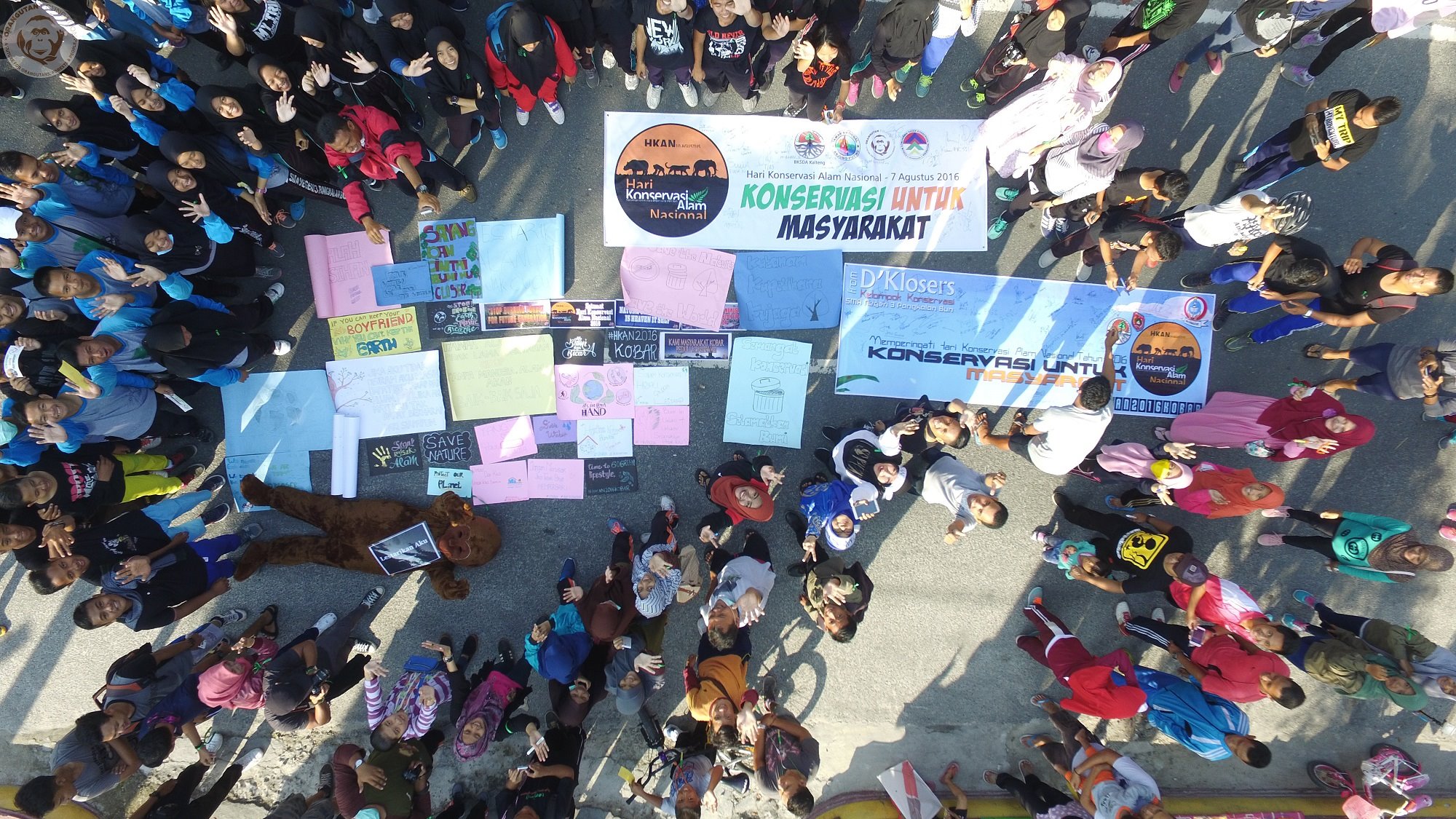
The overall aim is to increase community awareness about the environment and the presence of wild orangutans in the surrounding forests. Leaflets will be distributed informing people how to avoid human-orangutan conflicts.
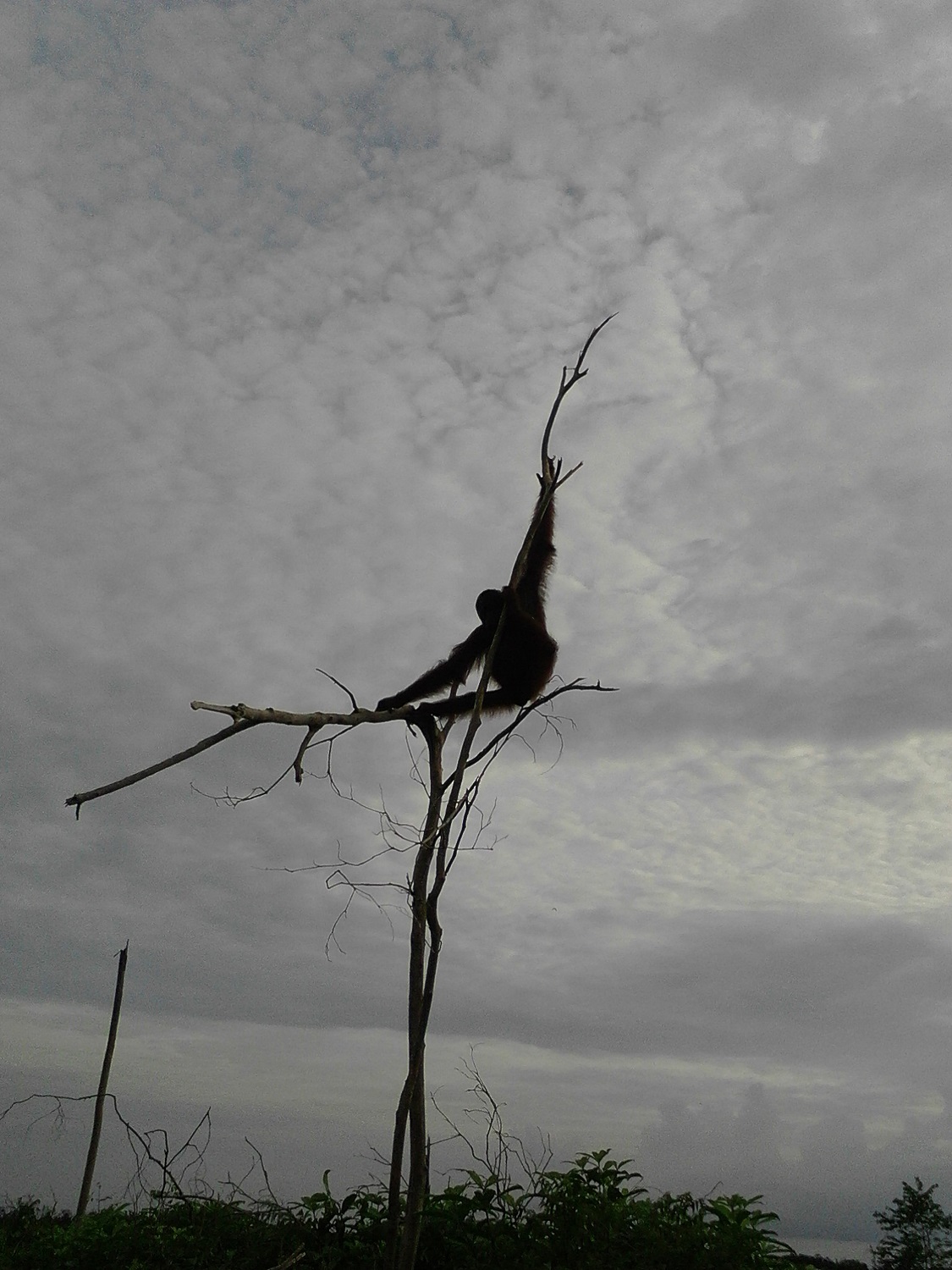
This action is needed more now, than ever before.
Watch this space for news and images of how the festivities went.
Protecting orangutan habitat
We only send out appeals when there is a real need for help – and right now, we urgently need funds to strengthen the protection of the Lamandau Wildlife Reserve, habitat of the critically endangered orangutan. In January and February, our forest patrol staff detected and tackled fires, deliberately lit to clear land, next to the reserve. They prevented the fires from spreading and saved thousands of acres of peat swamp forest from going up in smoke. In March, we met with the provincial government to push for those responsible for starting the fires, to be held to account.
The Lamandau Wildlife Reserve totals 158,144 acres of tropical forest. The Foundation's staff put themselves at risk as they battled to protect the forests, home to a population of 500 orangutans. Half of these were reintroduced or translocated by the Orangutan Foundation and given a second chance of survival in the wild. We must make sure they are safe.
It costs a quarter of a million pounds a year to protect the reserve and the wildlife. A significant commitment for a small charity, but a relatively small amount considering the invaluable riches and services the forests contain and provide.
The Orangutan Foundation runs and staffs eight guard posts in and around Lamandau to deter and prevent access to the forests. Our staff, all committed local Indonesian conservationists, patrol on foot or by boat. We use conservation drones and GIS to map and document illegal activities.
The map below shows the guard posts (red triangle on blue).
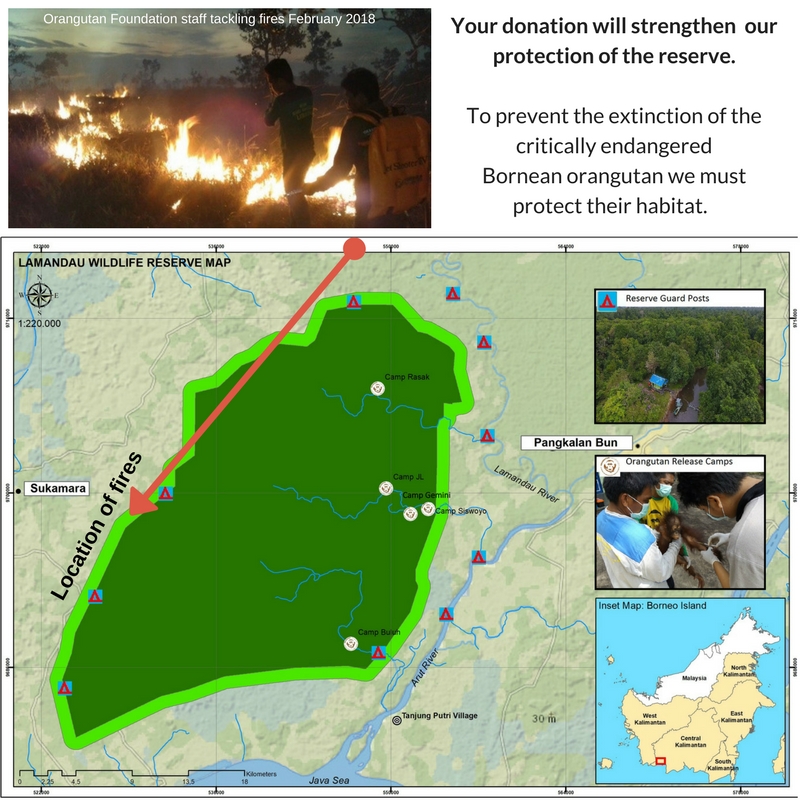
In 2017, we stopped illegal mining inside the reserve and since the beginning of 2018, our forest patrols have detected and stopped two cases of illegal logging.
Yet, despite years of investment in successful community awareness, there remain a small few who want to exploit the forest for their own interests. As pressure for land increases our fight to protect standing forest, to stop it being logged or converted to oil palm, will only become more difficult. Protecting Lamandau is an ongoing commitment: we cannot temporarily close a guard post due to insufficient funds, in the hope that we might start up again next year. If we stop protecting the reserve, we know that we will lose it: the forest and its precious wildlife could be gone in an instant.
Bangkal is one of the orangutans at risk. Originally released into the neighbouring Tanjung Puting National Park, Bangkal was severely injured in 2000 when illegal loggers attacked him with boiling-hot oil. Following a long period of recovery, he was released into Lamandau, at Camp Gemini, one of our five release camps in the reserve. Bangkal, now strong, healthy and independent, has since become the dominant male.Aan, an adult female, was shot and permanently blinded in an oil-palm plantation. Foundation staff moved Aan to the Lamandau Reserve, where she now lives with round-the-clock monitoring by our staff and vet.
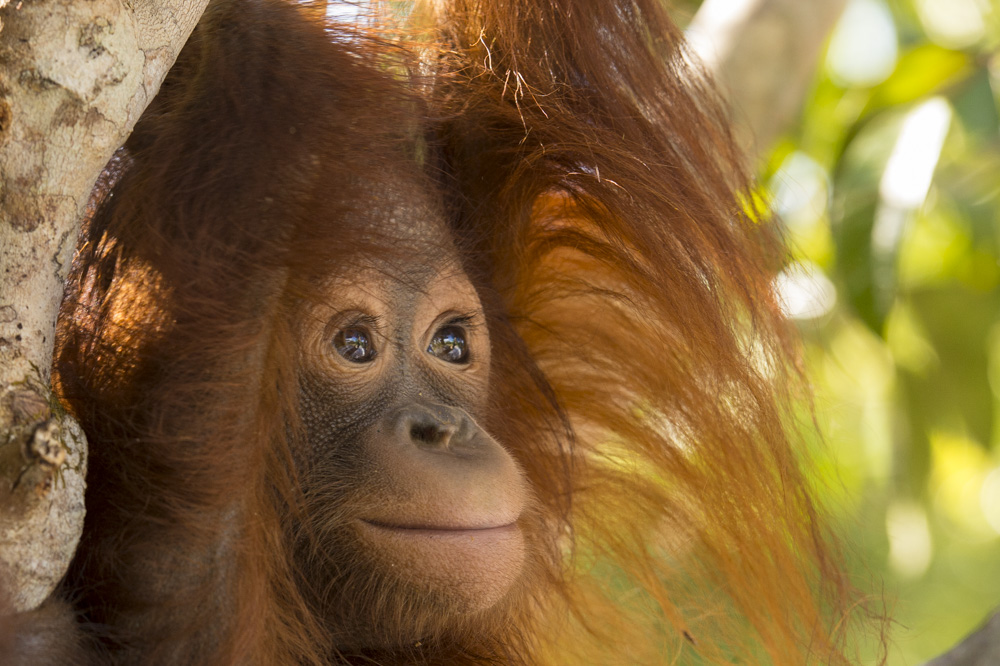
We also care for ten orphaned infant orangutans at our release camps - plus many dozens of reintroduced and translocated adults that are thriving in the wild under our protection. We owe it to these orangutans to keep their forest home safe.
Please DONATE SECURELY THROUGH OUR WEBSITE, by calling 020 7724 2912, or by sending a cheque payable to ‘Orangutan Foundation’ to Orangutan Foundation, 7 Kent Terrace, London, NW1 4RP. If you are unable to donate immediately but want to make funding pledge, whether through fundraising or a delayed donation, please contact us to discuss options – we will work with you however we can.
Sponsor the protection of Lamandau Wildlife Reserve
- £15 protects 10 acres of forest for one year
- £37.50 protects 25 acres of forest for one year
- £75 protects 50 acres of forest for one year
- £150 protects 100 acres of forest for one year
We must act today to secure the future for orangutans, forests and people.
With sincere thanks,
Ashley Leiman OBE
Founder & Director/Trustee
![]()
Forest fire spreads to orangutan habitat
Fires, deliberately lit next to an oil-palm plantation, have spread to the Lamandau Wildlife Reserve, home to over 500 critically endangered orangutans. This is the second fire this year. Please donate to help us.
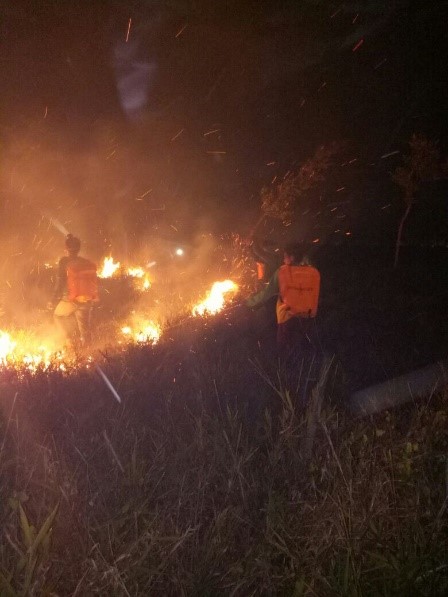
The Orangutan Foundation's guard post staff spent yesterday evening and all last night fighting the fires. We can't thank them enough for their bravery and efforts to protect the Wildlife Reserve. The fire, as the map below shows, was on the other side from our Orangutan Release Camps and so our young orphaned orangutans and Aan, the blind orangutan, are safe. However, other wild orangutans and species will have been harmed by these fires.
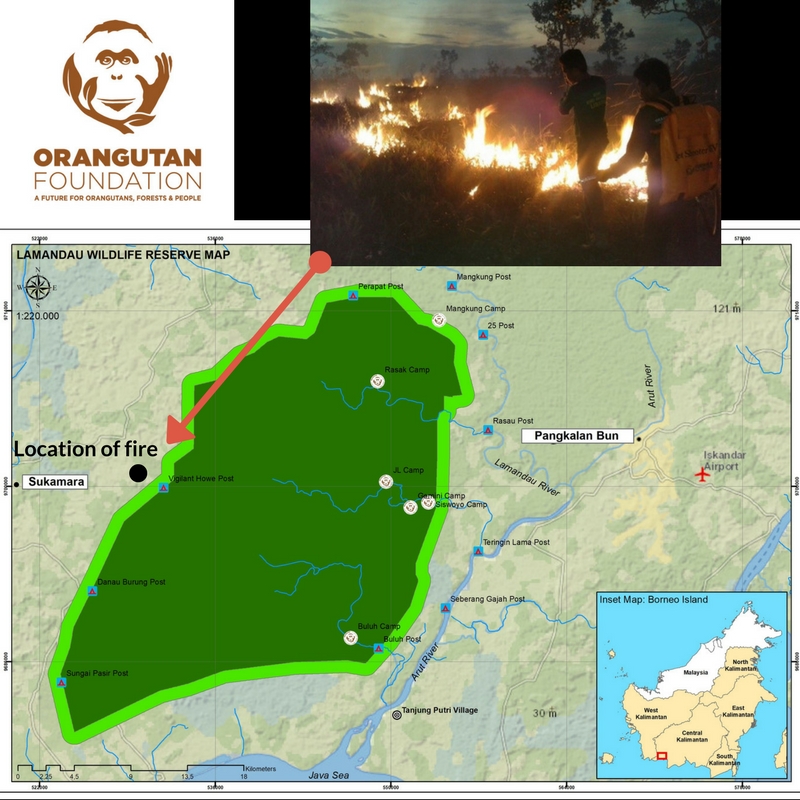
We are alarmed that fires have been lit in the first place but are spreading so easily, especially at this time of the year. It is meant to be the wet season but the scrub land, just bordering the reserve, and the forest, inside the reserve, is unusually dry due to lack of rain. In 2015, an El Nino year, over 11,000 hectares of the reserve burnt. This cannot happen again.
At around 18.00 hrs yesterday our guard post staff at Post Vigilant Howe detected fires about 3 km outside the boundary of the Lamandau Wildlife Reserve. The fires are thought to have started near to PT Sampurna oil-palm plantation.
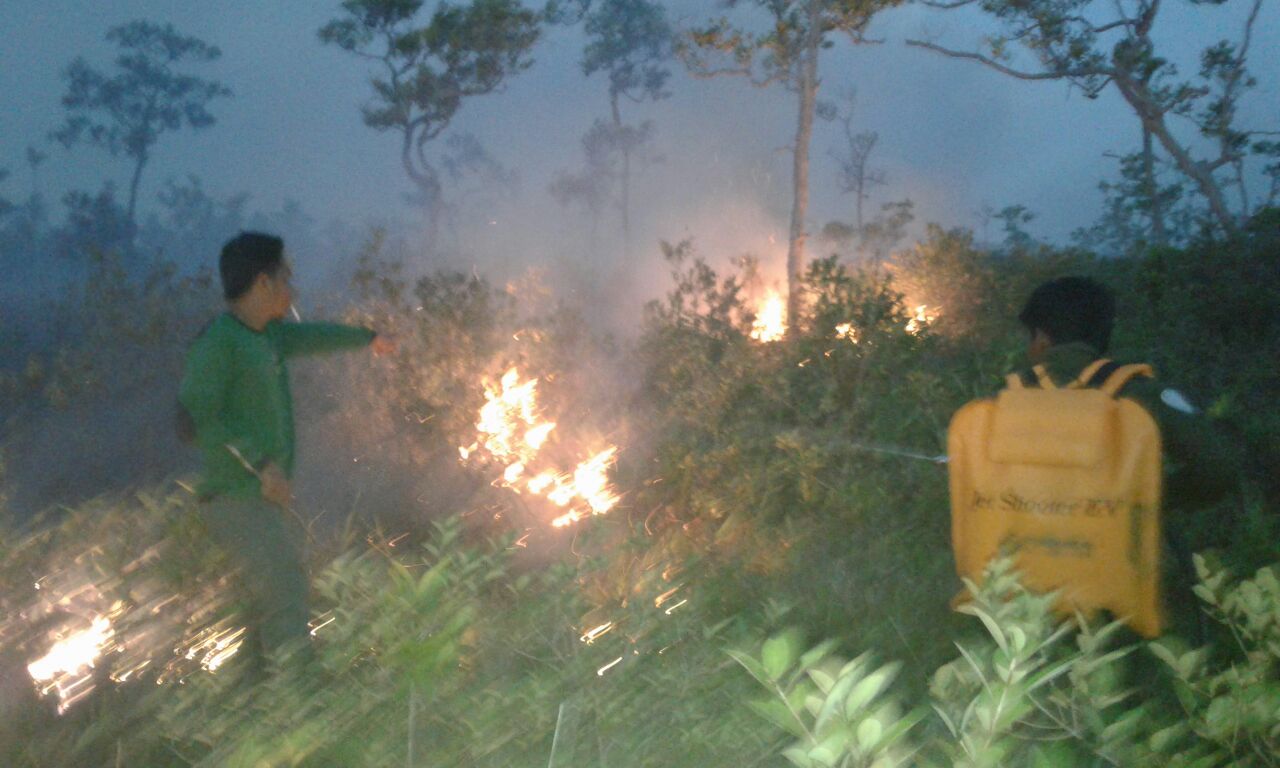
Our staff from Guard Post Danau Burung and Government Resort staff BKSDA SKW II from Guard Post Sungai Pasir tried to extinguish the fires for 3 hours using water jet pack shooters. At 20.00hrs they realised the fire was growing due to the wind and ready fuel of dried shrubs and grass. They informed the Head of BKSDA Resort SKW II, Mr. Sugih Trianto and requested extra help. Our staff from Guard Post Perapat and even our Forest Restoration Manager, Anto, went to help tackle the fires.
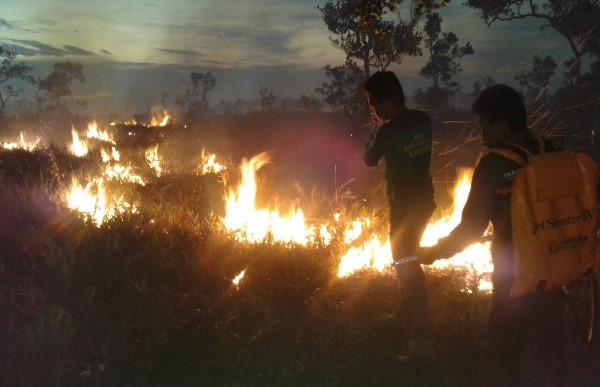
At around 03.00hrs the fire was eventually extinguished by an exhausted team, made up of Orangutan Foundation and staff of BKSDA SKW II.
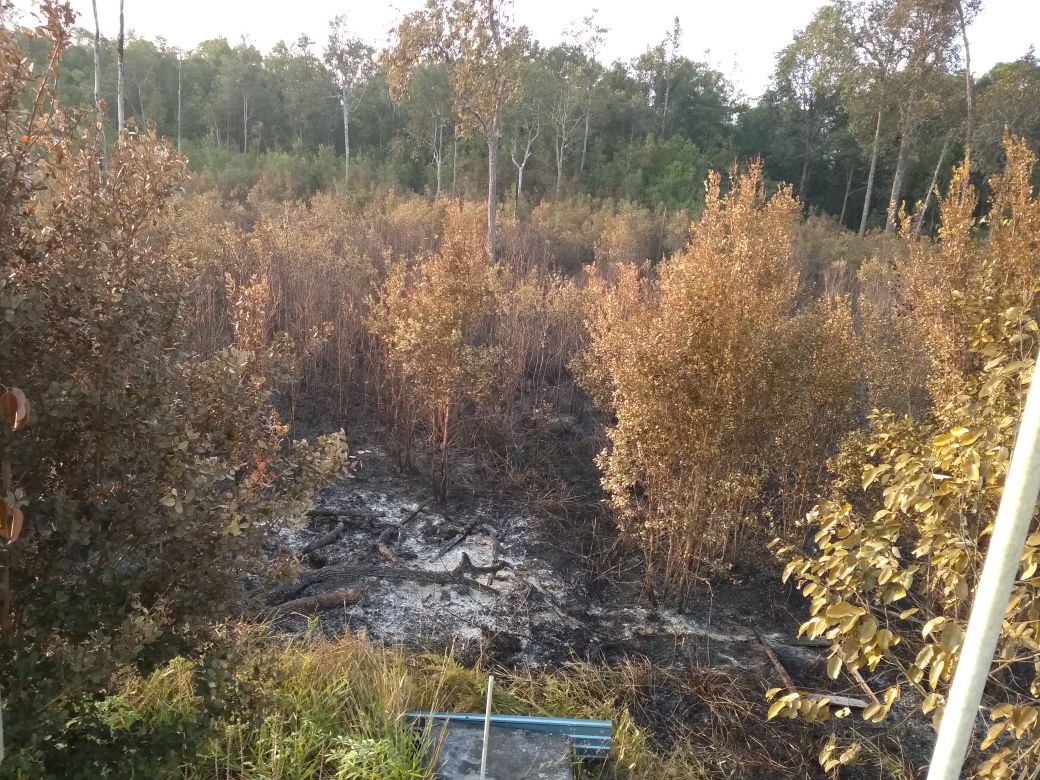
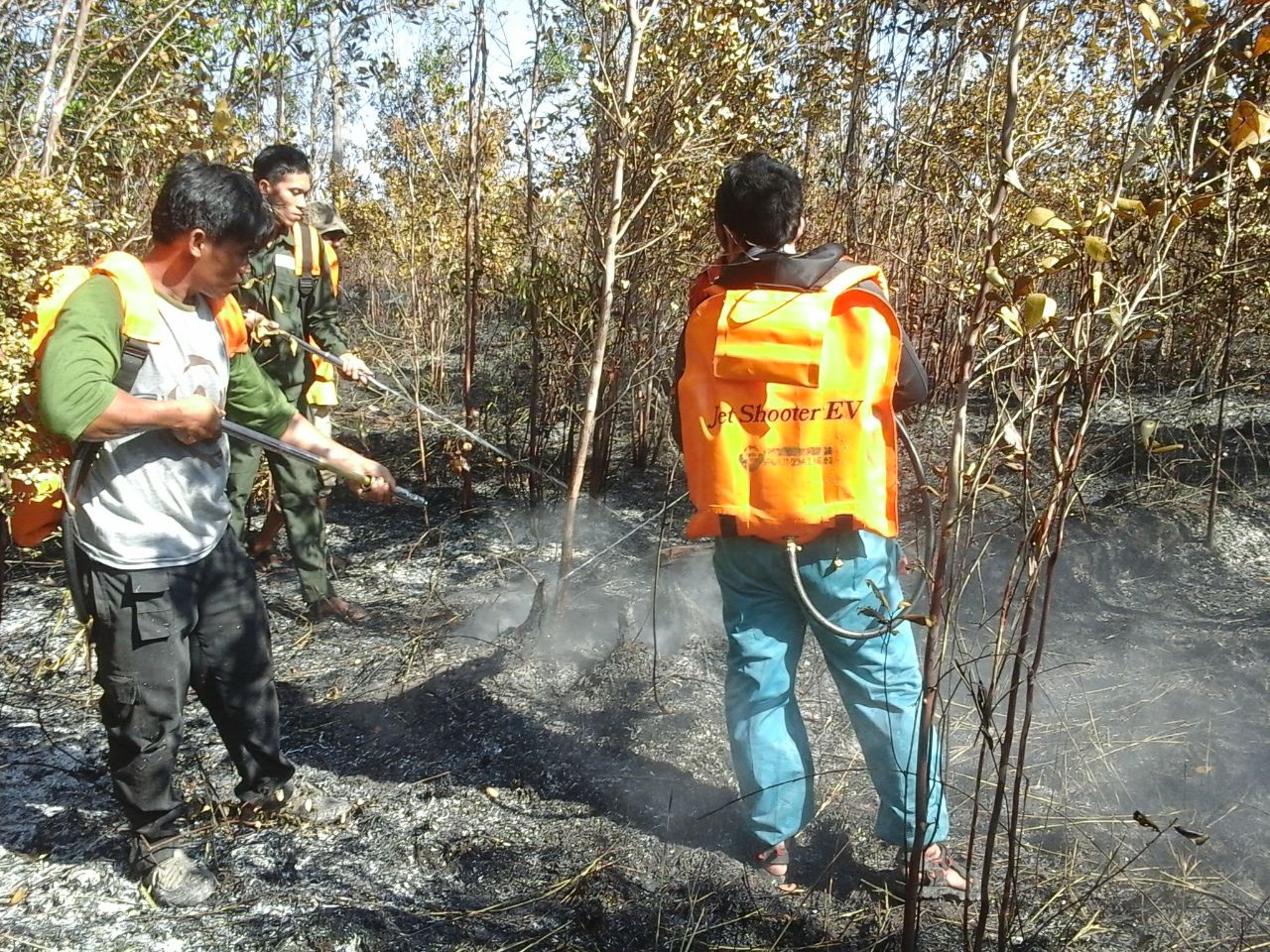
At 10.00 hrs today our team returned to the location of the fire and extinguished any smouldering vegetation. The fires were very close to our Guard Post Vigilant Howe. Using GPS, the total area of the fire was 61 hectares, which is the equivalent to the area of 150 football pitches.
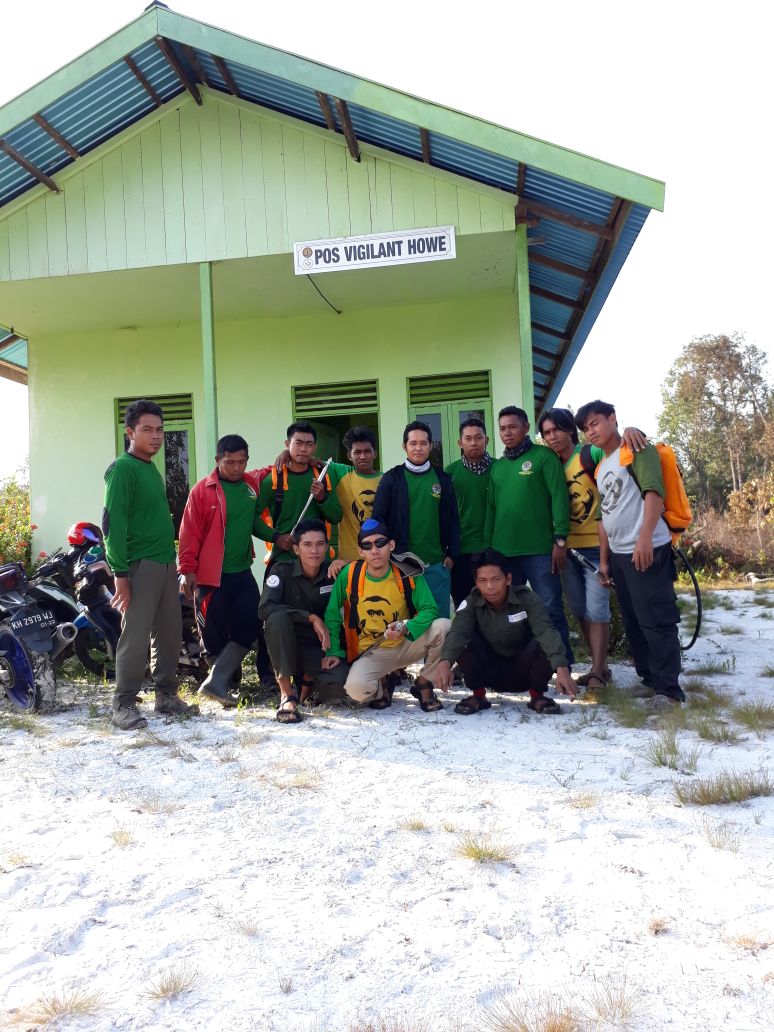
At a time when orangutan numbers are falling dramatically we need to ensure their habitat is safe. This is the second fire this year alone and we have also detected and stopped 2 cases of illegal logging. Help us to protect these forests and orangutans. If you can, please consider making a regular donation. Donate today
Thank you,
Orangutan Foundation
Vet treats orangutans but fires are causing concern
Our Vet, Dr Dimas, has been treating one of the young orangutans in our Soft Release Programme for a dry scalp. Dimas, has been applying a moisturising ointment and our staff will continue with this treatment.
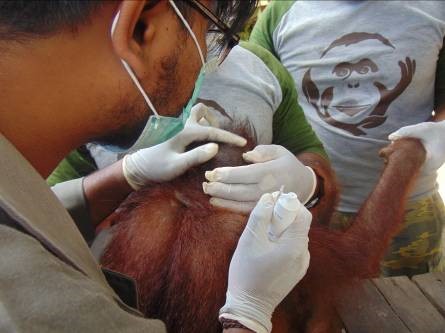
All our young orphaned orangutans were also given vitamins and medication to prevent parasitic worm infections.
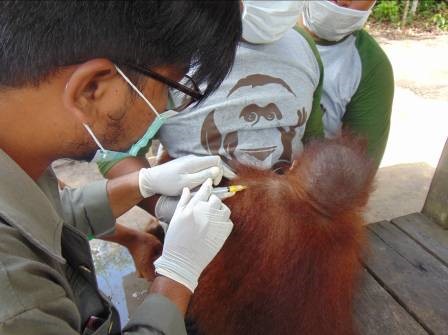
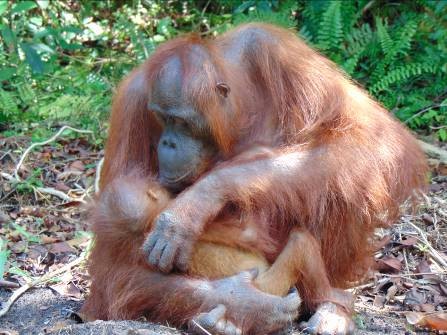
While going from Camp Siswoyo to Camp JL within the Lamandau Wildlife Reserve, Dr Dimas and Azhari (Orangutan Reintroduction Manager) had to use a kelotok boat (flat bottomed) instead of a speedboat because the water level is getting lower. The dry season seems to have come early this year to Central Kalimantan, with very little rain.
There are worrying reports of more fires, right on the boundary of the Reserve. We'll keep you updated on this situation.
Please click here to donate to our work.
Thank you,
Orangutan Foundation
Stop habitat loss, stop orangutans being killed
In the last month we have heard disturbing reports about the cruel and brutal killing of two critically endangered Bornean orangutans. Sadly, our staff care for the victims, of these sort of actions, every day. We're still caring for Aan, shot 104 times and left permanently blind. Little Bumi, rescued last year, 8 pellets removed, his mother must have been shot and killed.
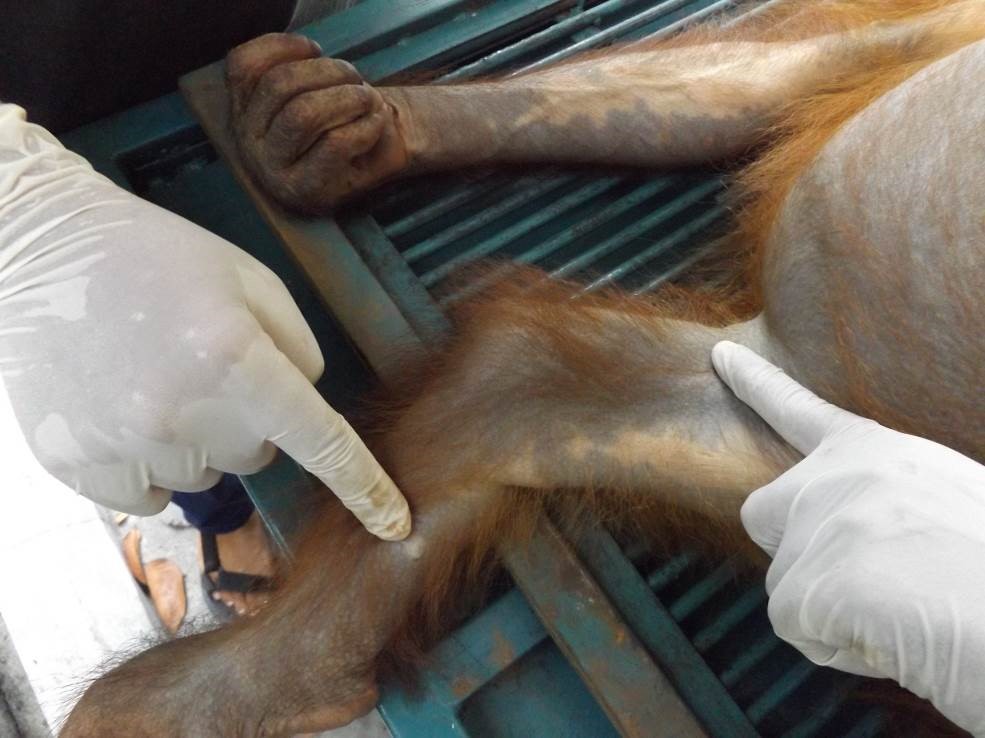
We ask ourselves, how could someone harm these gentle, intelligent and peaceful beings?

The killing of an orangutan is a visible threat, rightly generating shock and outrage. The invisible threat that forces orangutans into increasing contact with humans, onto oil-palm plantations or village farms, is habitat loss. We use the term invisible because habitat loss does not elicit the same level of response as an orangutan killing.
In the last month our guard post staff have tackled illegally lit fires and prevented them spreading, but still 30 hectares burnt. This week, they detected the second case this year of illegal logging, right on the boundary of the Lamandau Wildlife Reserve. This is meant to be strictly protected forest, it has a population of over 500 orangutans. We need to keep it protected and the orangutans safe.
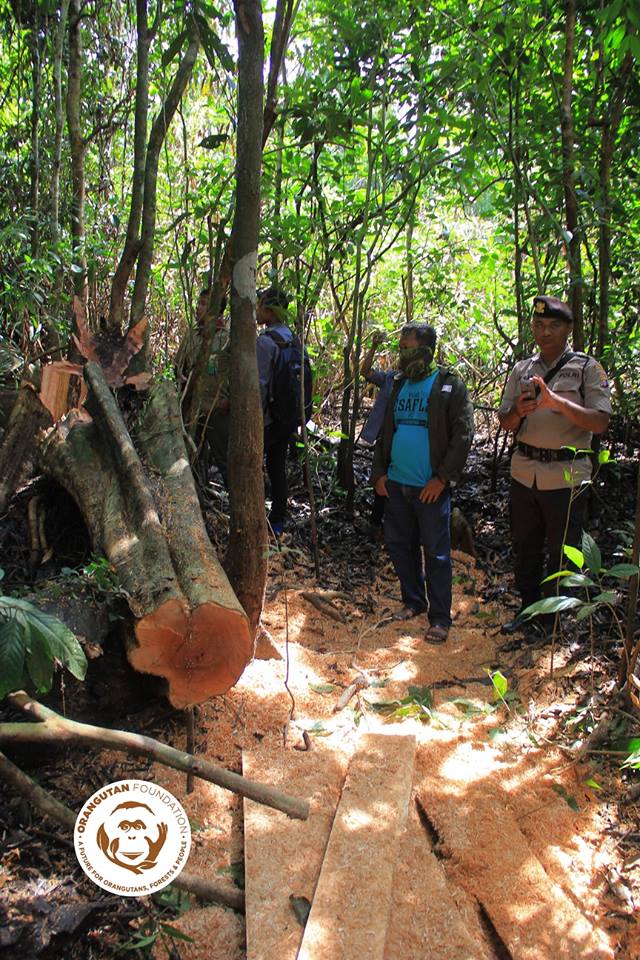
Why does the image of a fallen tree not also generate the same outrage? When forests are cleared, orangutans and hundreds of other species are harmed or even killed. Some survive, if they can move to another area of forest. This increases competition for resources and forces them into closer contact with humans. It is because we can’t see the immediate impact on orangutans and so our response is different.
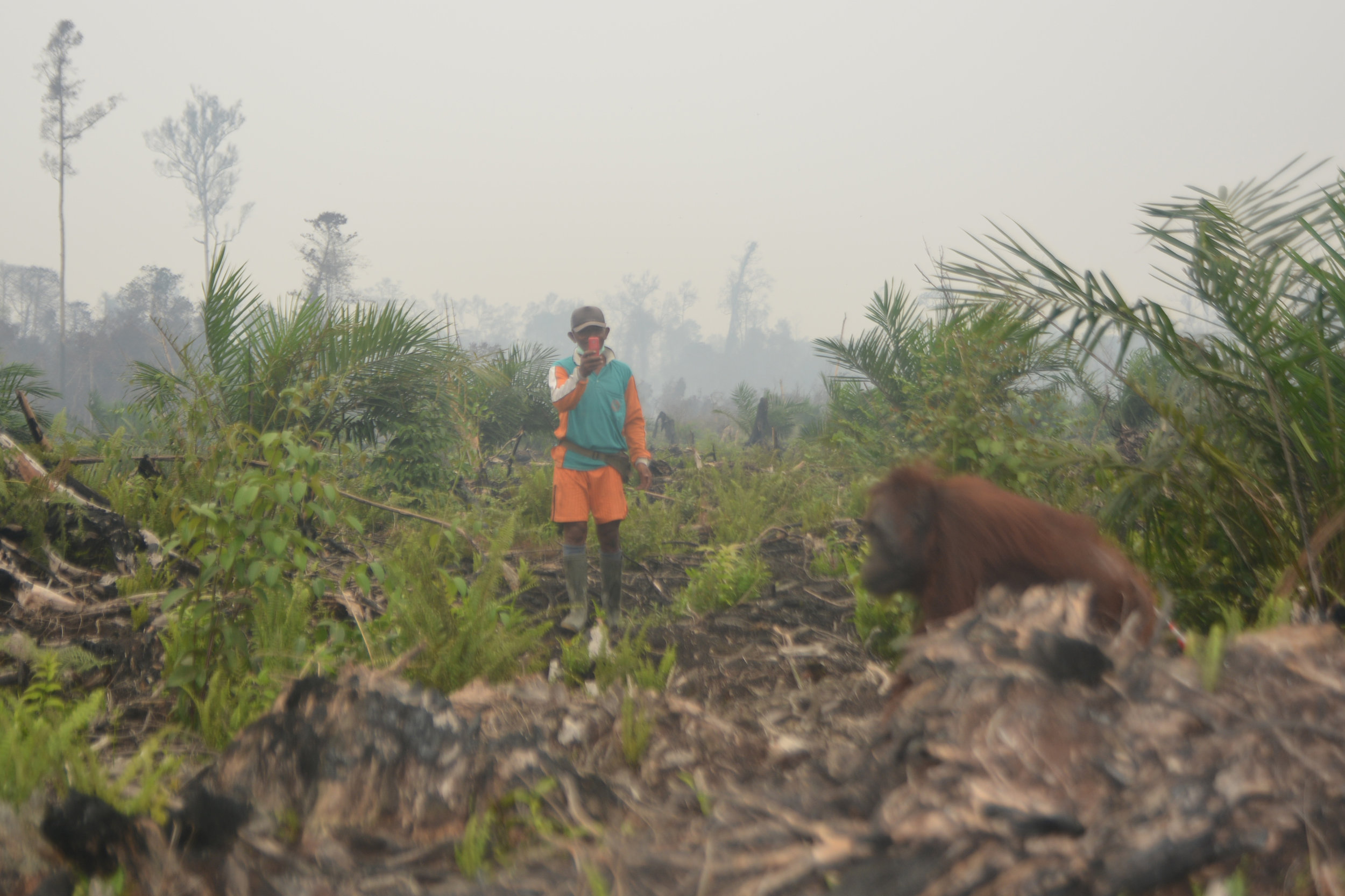
We need your help now, more than ever. Our guard post patrol staff require ongoing support to prevent illegal activities and further loss of orangutan habitat. The Lamandau Wildlife Reserve is huge, 158,144 acres of tropical forest (one acre is the approximate size of one football pitch). Our staff do a fabulous job patrolling such a large area but need to be supported.
Please help us to keep these vital forests standing and their precious inhabitants in wild. Please donate today.
If you can, please consider becoming a Guardian of Lamandau Wildlife Reserve, from £16.50 a month (the equivalent of 55p a day) you can make a significant difference. Thank you.
We thank the West Kotawaringin Police, KPHP Kotawaringin Barat, and BKSDA Kalteng for their joint patrols.
Vet's first orangutan rescue
The Orangutan Foundation is delighted to welcome Dimas Yuzrifar as its new vet, replacing Dr Steven, who has now returned to Bali. Being "thrown in at the deep end" is certainly how the first week has been for Dr Dimas! Last weekend we received reports of a wild orangutan in village forest. This was passed onto the government agency for wildlife, BKSDA SKW II Pangkalan Bun.
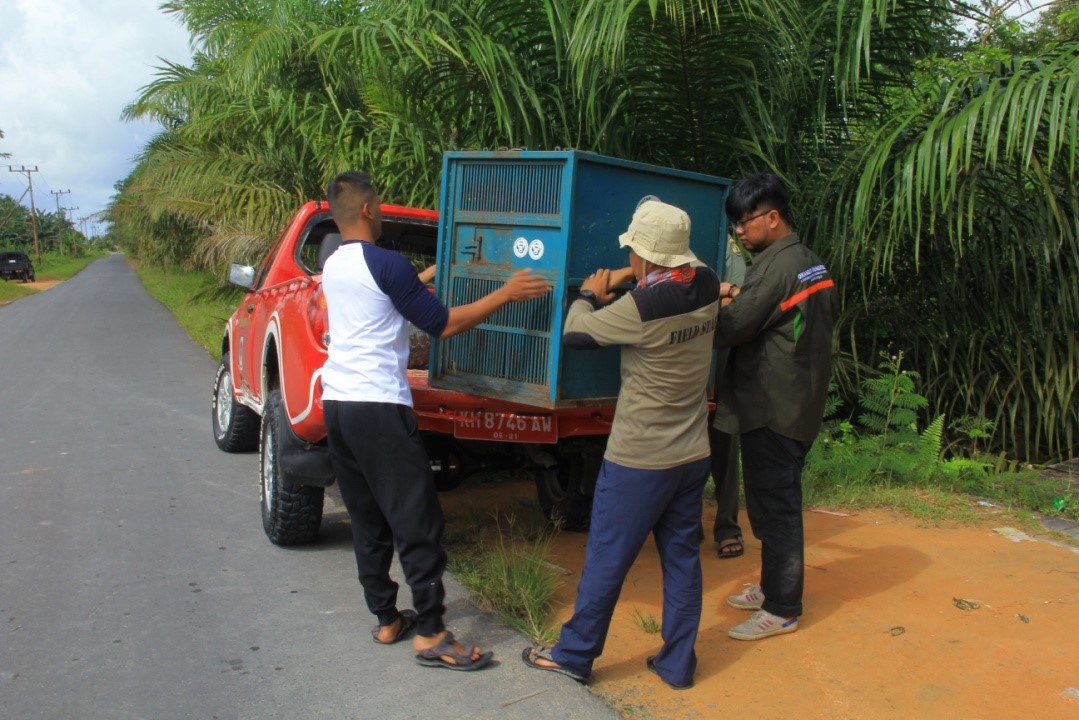
The orangutan was found close to oil palm, banana and rubber plantations owned by local residents. The villagers feared the orangutan would damage their crops and so BKSDA decided, in this case, to capture and move (translocate) the orangutan, to avoid any conflict arising. Dr Dimas managed to anesthetize the orangutan. After being caught the orangutan was identified as female with an estimated weight of around 25 kg. The next day after checking the orangutan was well and active she was released into the safety of the protected Lamandau Willdife Reserve.
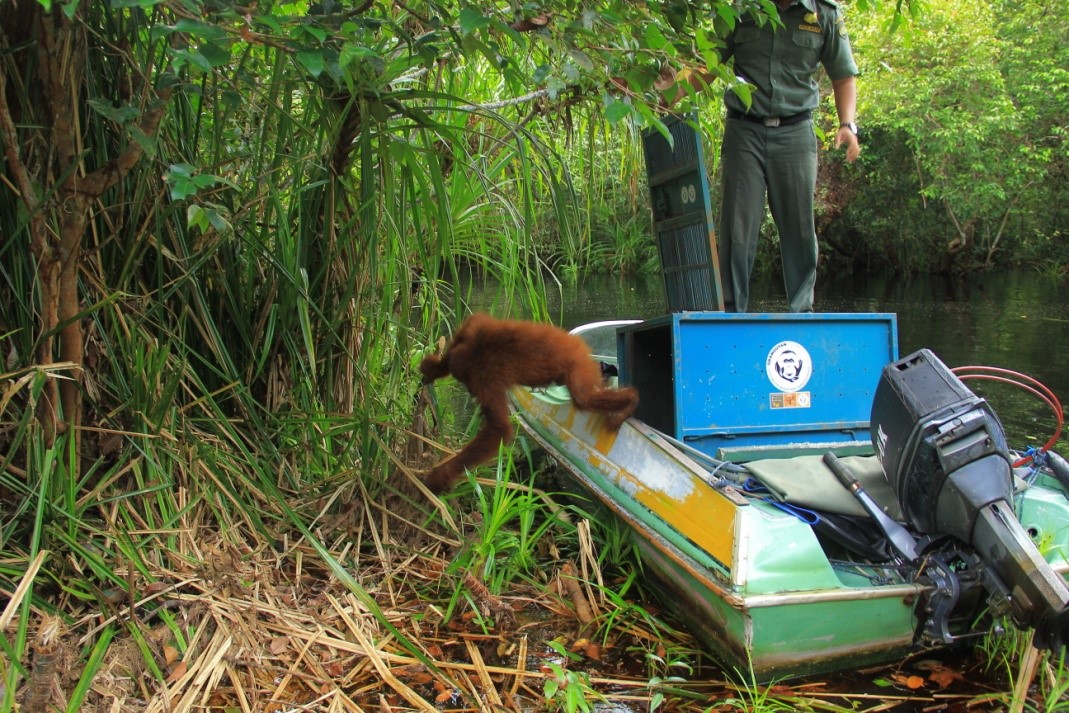
Watch this clip to see how quickly the orangutan leaves the transport cage and disappears into the forest.
After the busy weekend with the translocation, Dr Dimas also spent time meeting and checking up on the young orangutans in our release camps. Here's a clip of young Satria playing in his night-time enclosure.
Wonder what the next week will have in store?
Thank you for supporting our work.
Donate to help us keep the Lamandau Wildlife Reserve and its precious orangutans and wildlife protected. Click here to donate - thank you.
An Orangutan Foundation snapshot - 2017
Here is a snapshot of the Orangutan Foundation’s year in the field, thanks to our dedicated Indonesian staff. Most importantly, thank you for your ongoing support. We truly could not do, what we do, without you. January: Miners evicted from the Lamandau Wildlife Reserve and mining equipment confiscated.
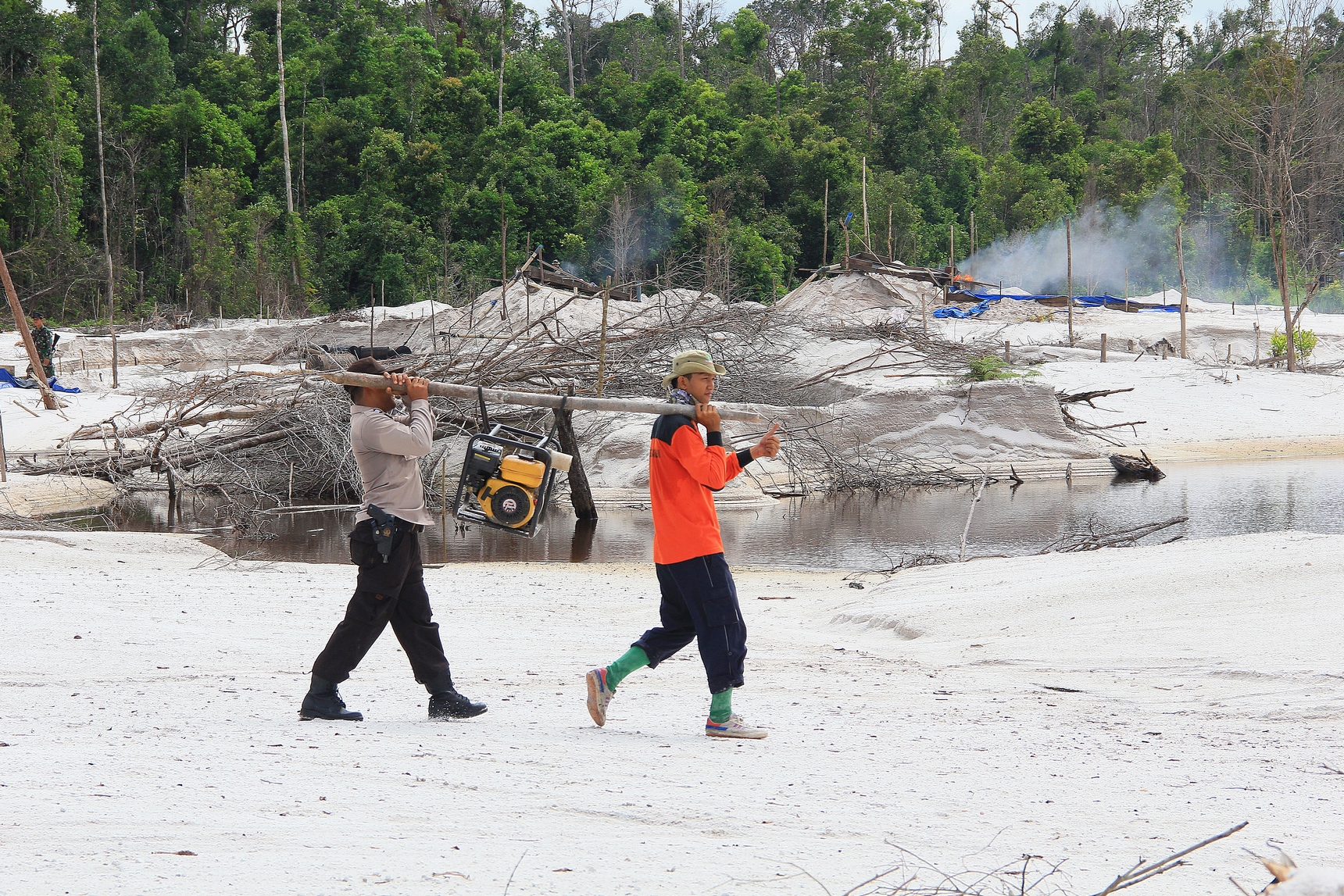
February: Attempts to restore sight to blind orangutan Aan sadly fail but her story galvanises support for her cause. We continue to care for Aan to ensure she has the best quality of life possible.
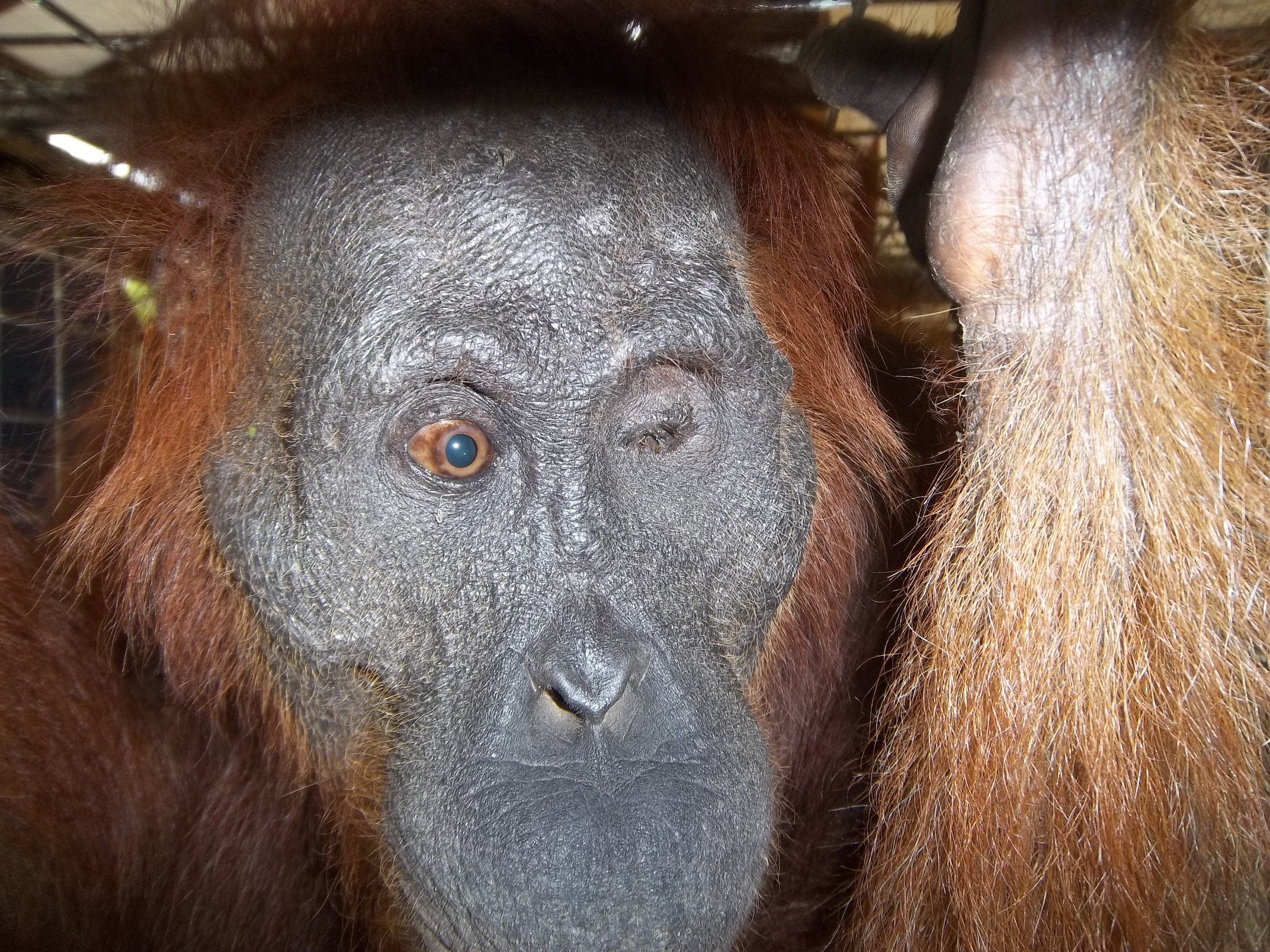
March: Infant orphans, Mona (top) and Nyunyu (below), are rescued and enter our Soft Release Programme, bringing it to 10 young orangutans being cared for.
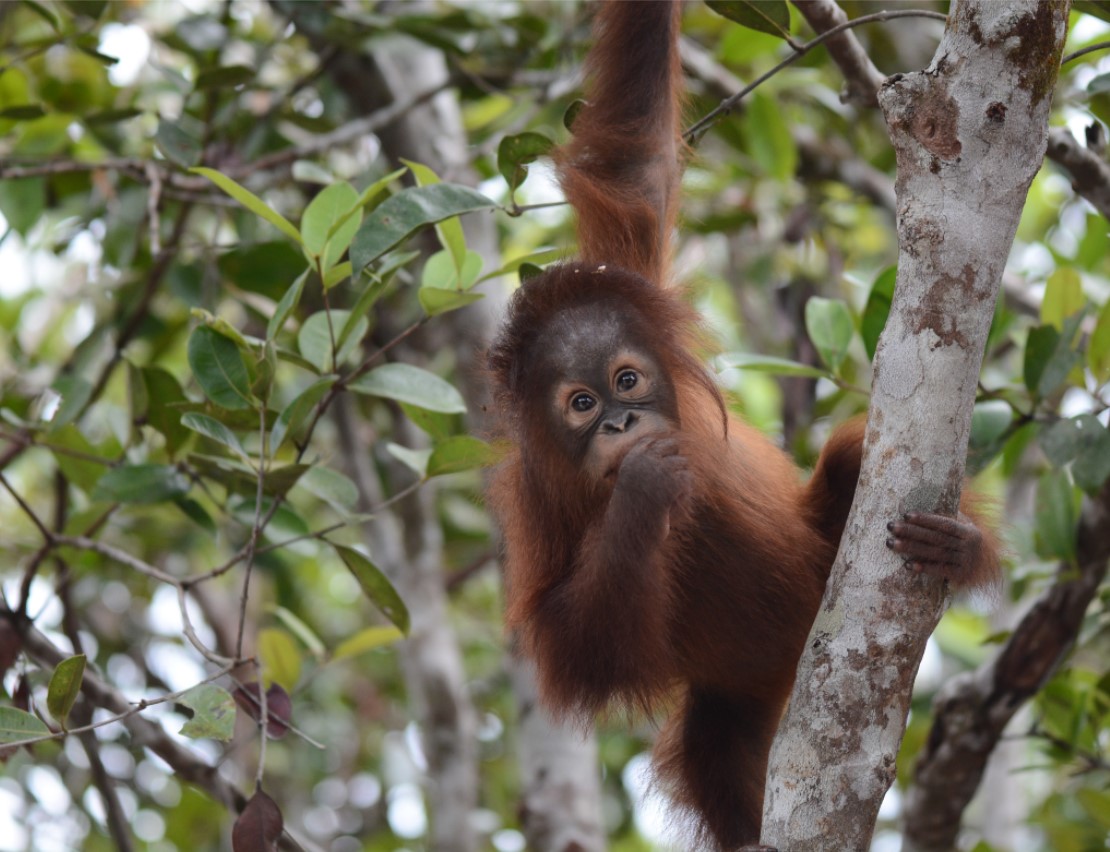
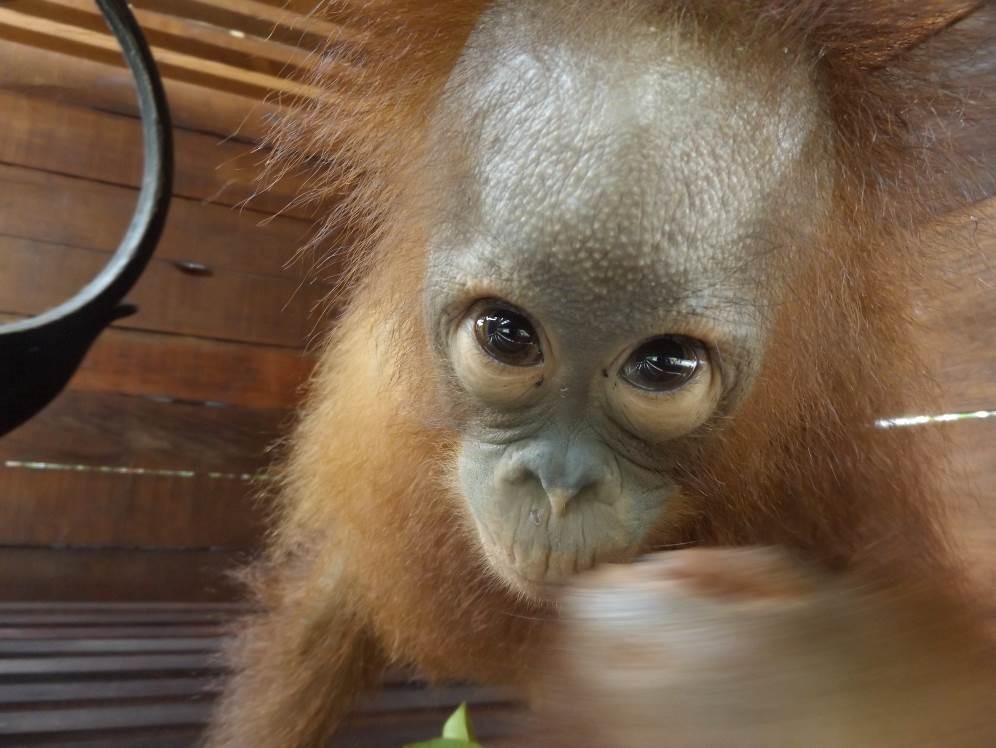
April: Orangutan Foundation, active on Earth Day, involving young Indonesian’s in cleaning up rubbish in their local environment.
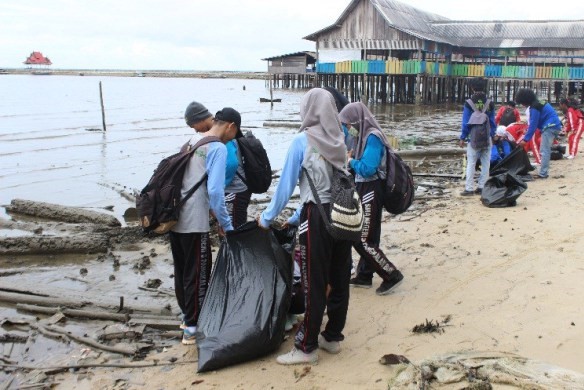
May: Publication of our new photo book promotes the wonders of the orangutan’s world and raises vital funds for forest restoration.
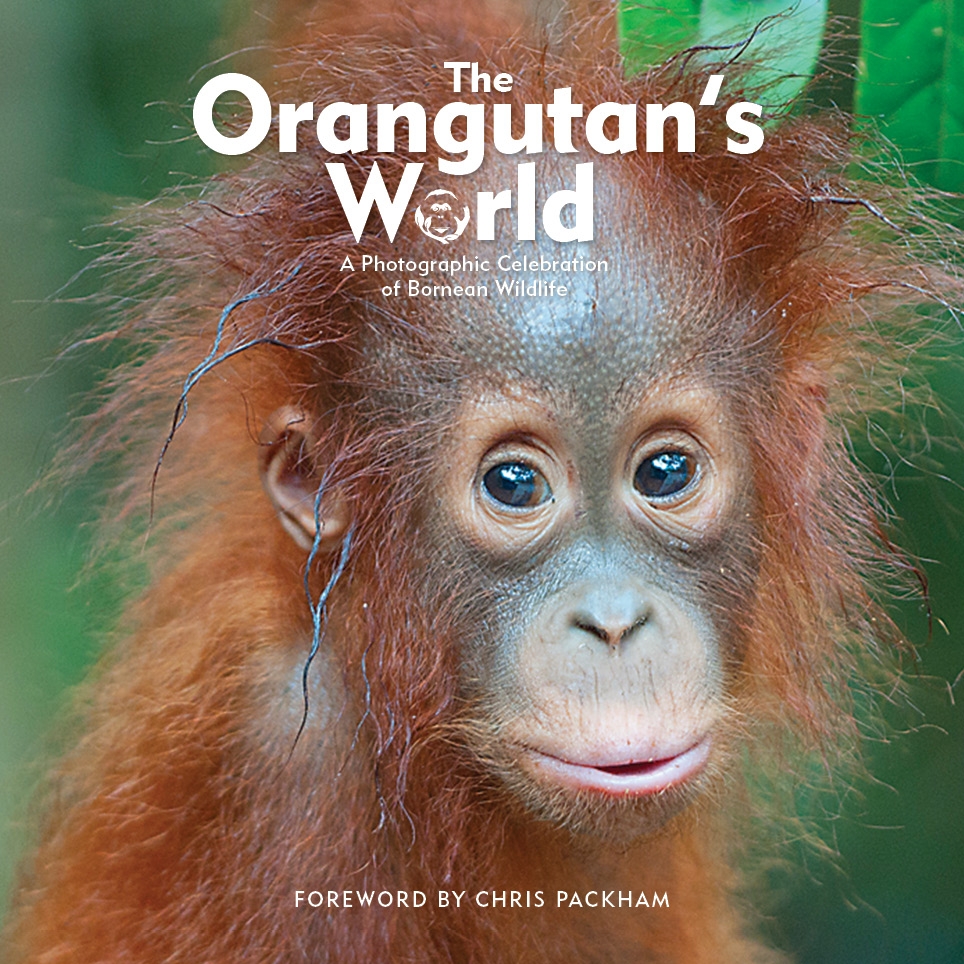
June: A new orangutan birth in Lamandau Wildlife Reserve. Venty shows off her new baby, Volvo.
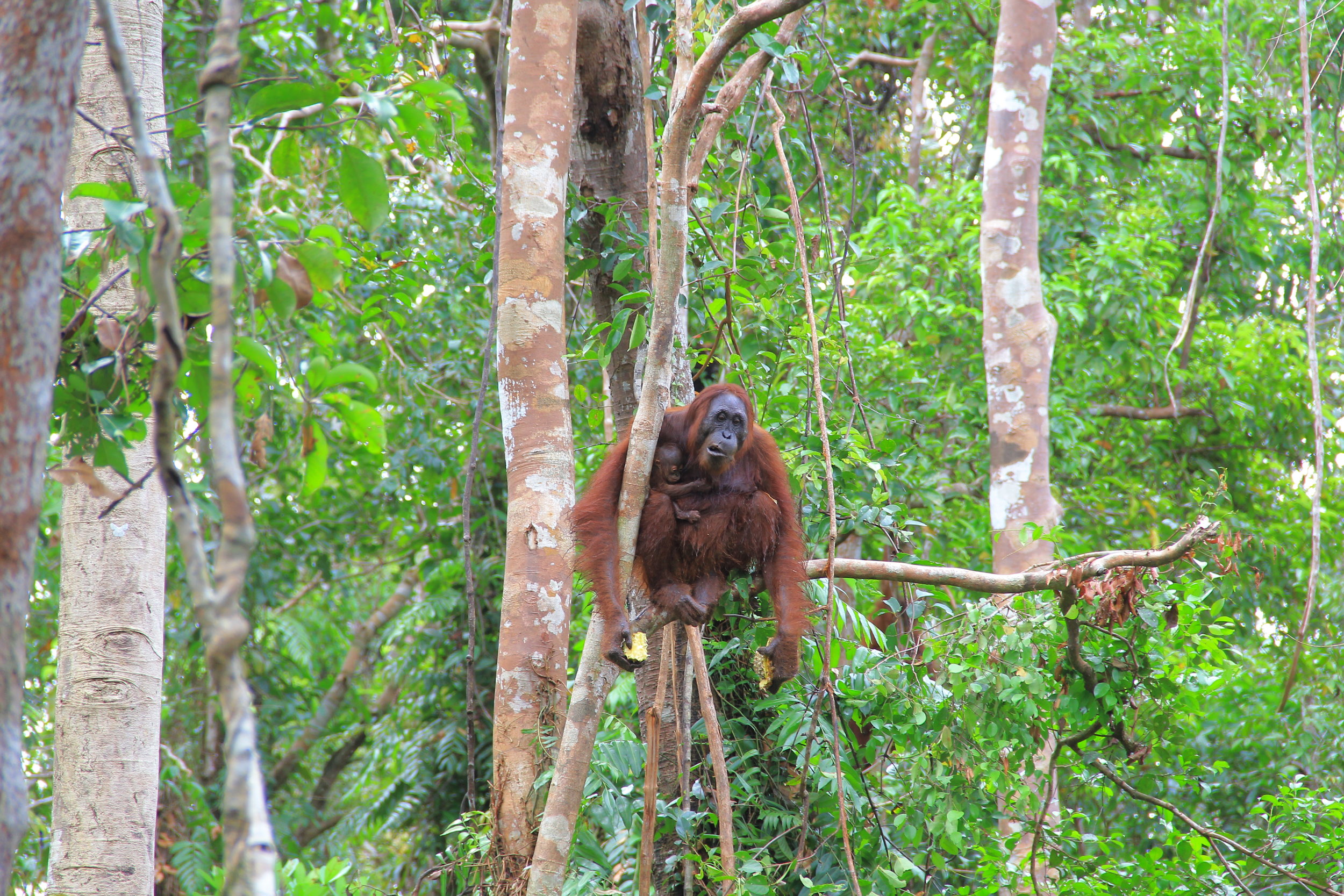
July: Another birth! Dedek gives birth to a healthy baby, named Dublin. Orangutans Jessica and Ketty, are released back to the wild!
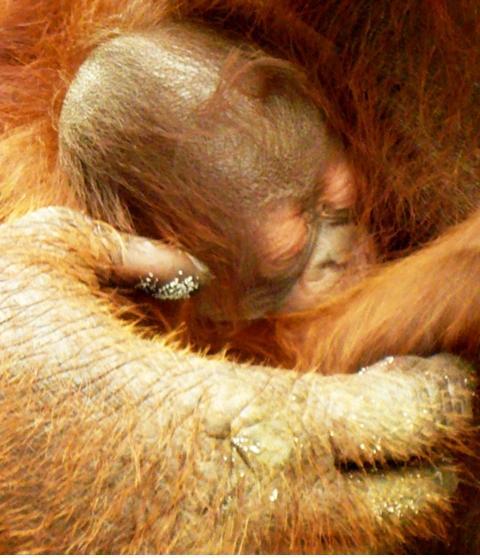
August: Orangutan Foundation staff help tackle fires and stop them spreading to the Lamandau Wildlife Reserve.
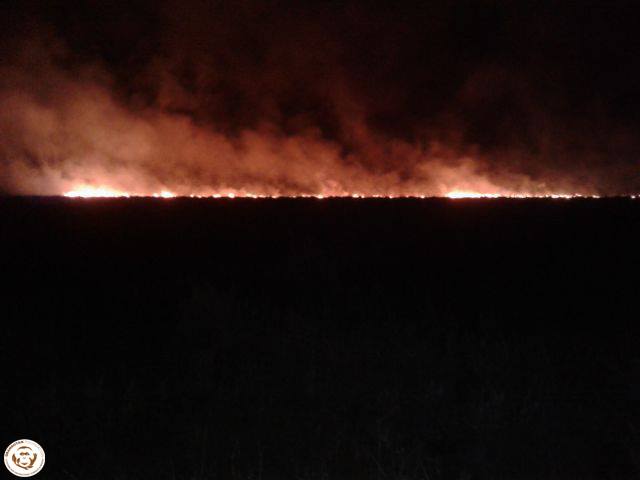
September: Orangutan Foundation Patrols in Tanjung Puting National Park remove and destroy illegal fishing traps, which also pose a threat to other wildlife species.
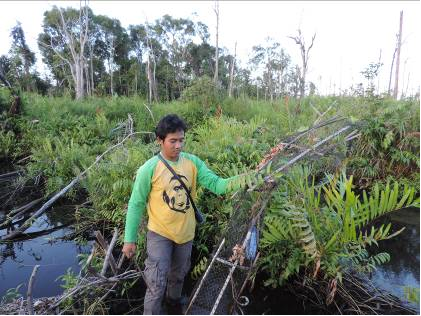
October: Bangkal, an ex-captive rehabilitated orangutan, reminds all who is King of Lamandau!
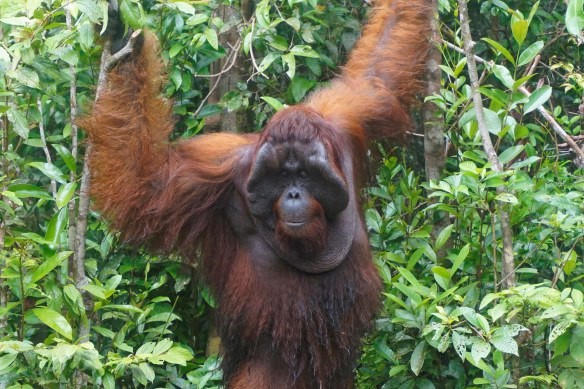
November: 22,000 tree saplings planted out in the Lamandau Wildlife Reserve in 2017
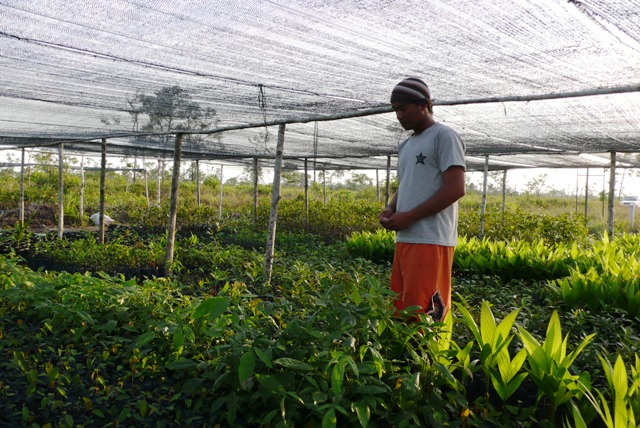
December: A wild female orangutan is rescued from a beach resort and translocated to the safety of the Lamandau Wildlife Reserve.
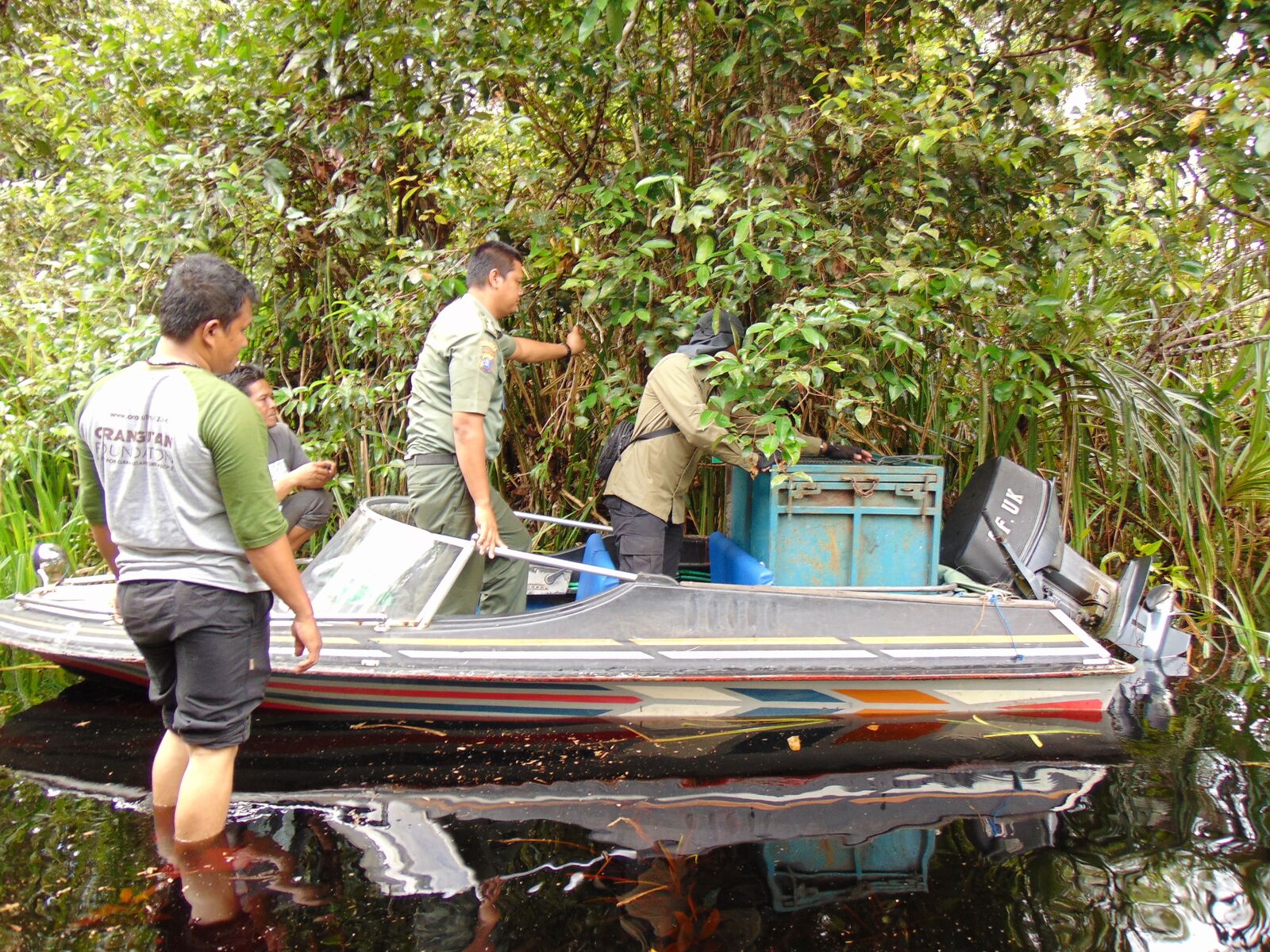
And to finish off our year here's Adib, the latest orphan orangutan to join us in November, making his first climb at Camp JL, in the Lamandau Wildlife Reserve.
DONATE to support our work
Challenging but successful orangutan rescue from beach resort
“As the pictures came through on WhatsApp and I saw an image of a beach I wondered what our rescue team had been up to!” - Ashley Leiman (Orangutan Foundation director.) A lone adult orangutan had been reported close to a beach resort where villagers were threatening to capture and harm it.
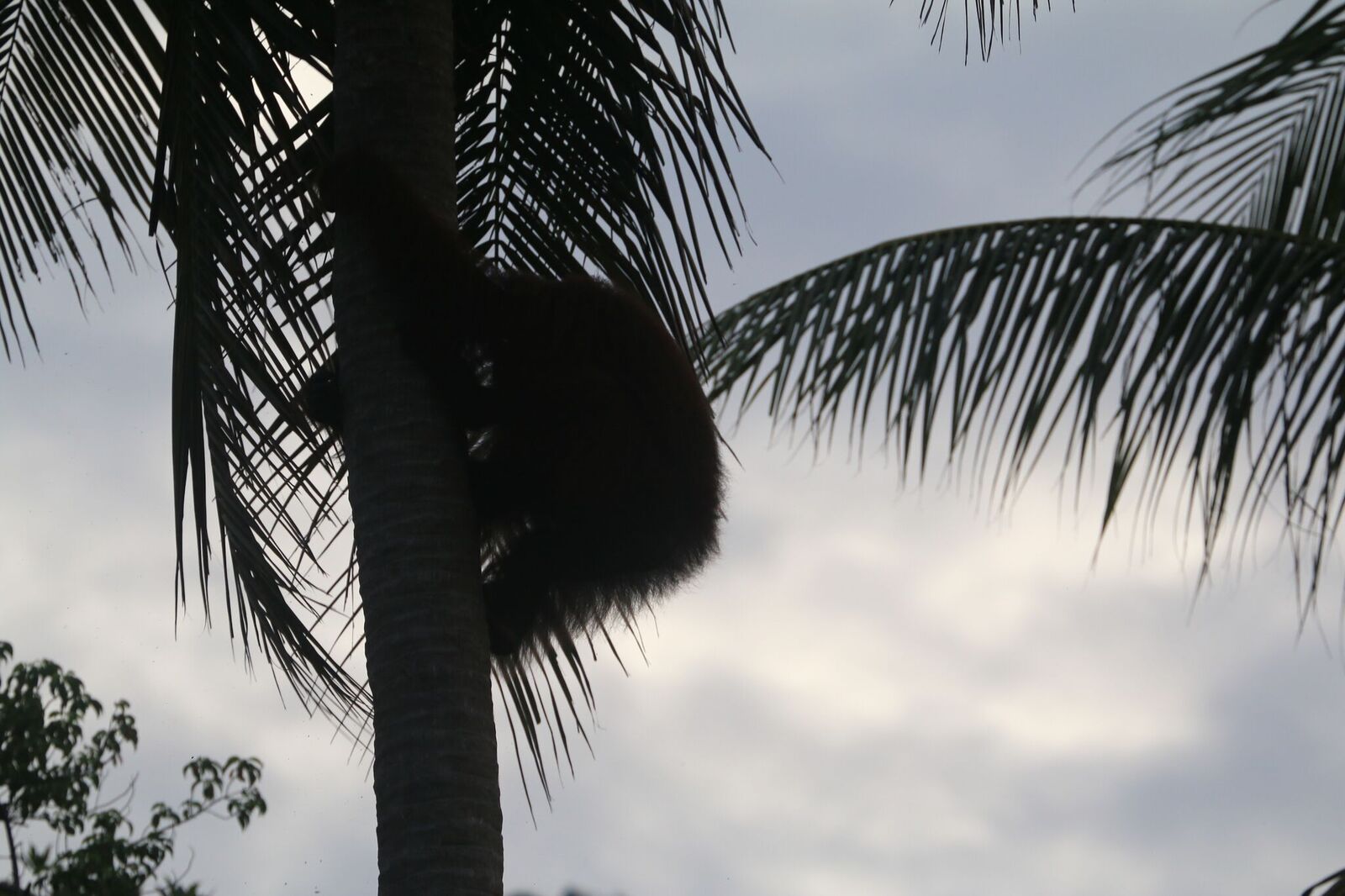
After receiving the call for help from the Wildlife Department (BKSDA SKW II), in Central Kalimantan, Indonesian Borneo, our vet and rescue staff had to drive, for 5 hours, through the night, to the town of Sampit.
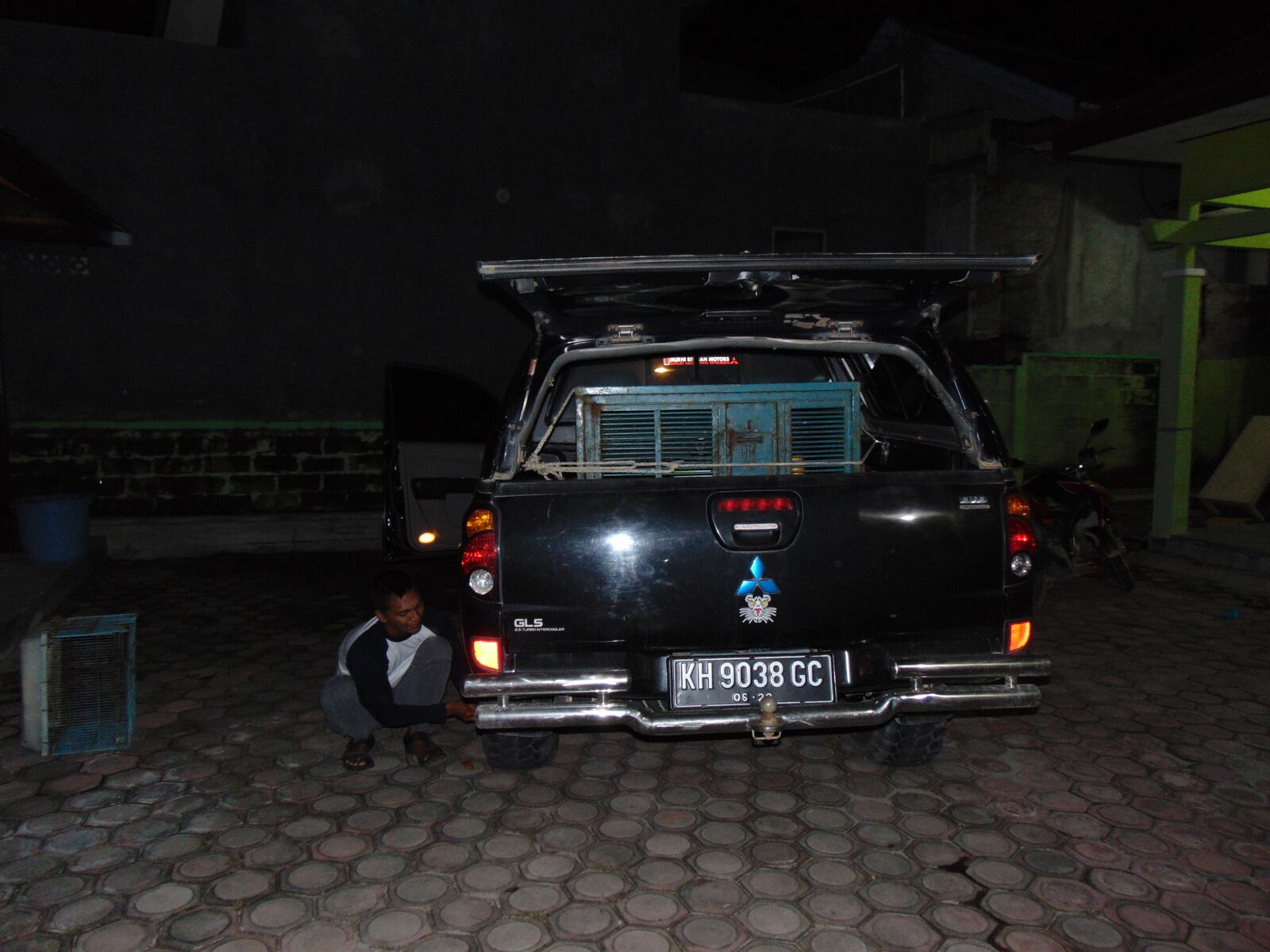
The team made a rescue plan and set off at 3am to where the orangutan was last seen. They found the orangutan’s nest and traces of faeces, but the orangutan was nowhere to be seen.
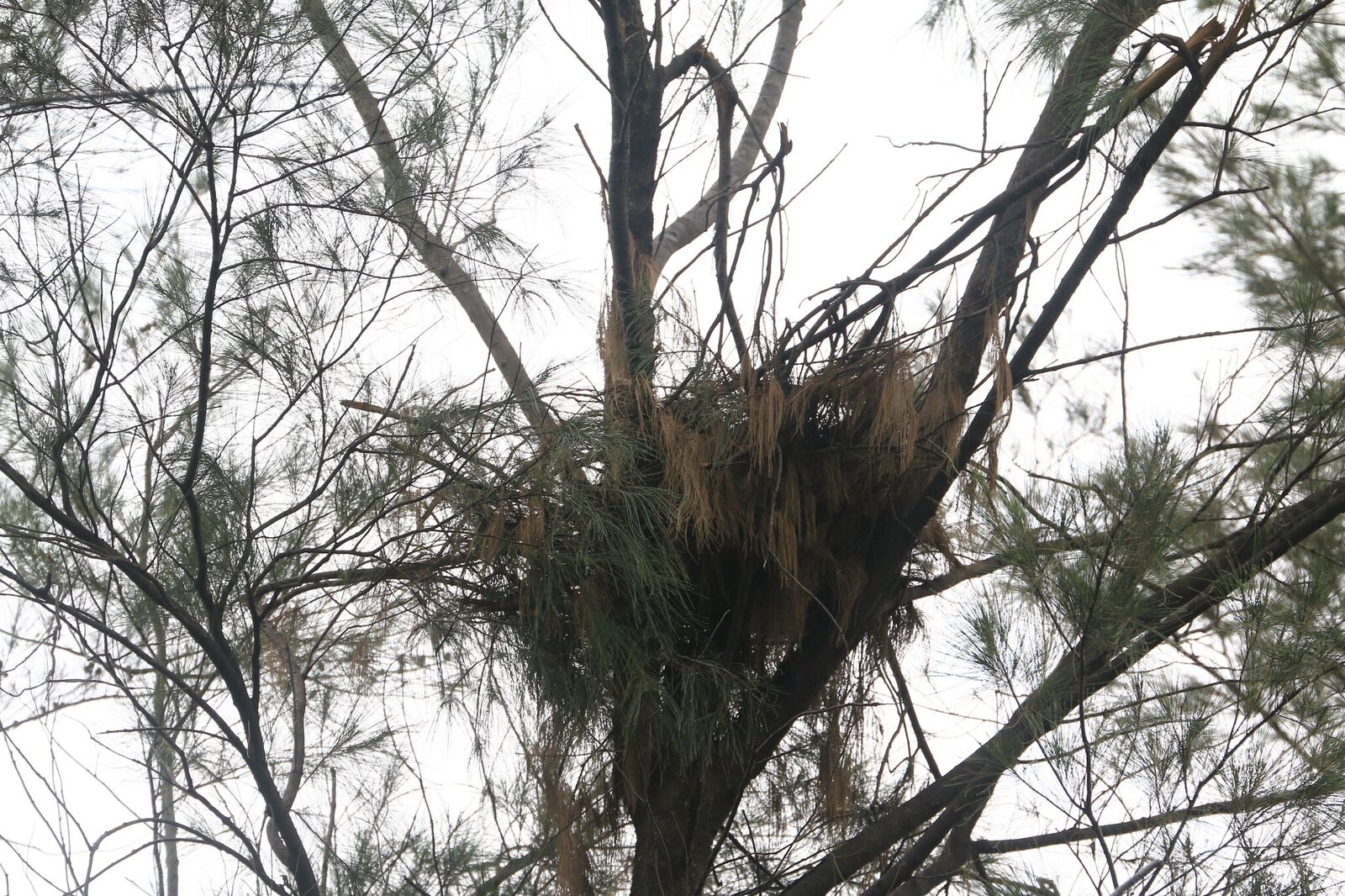
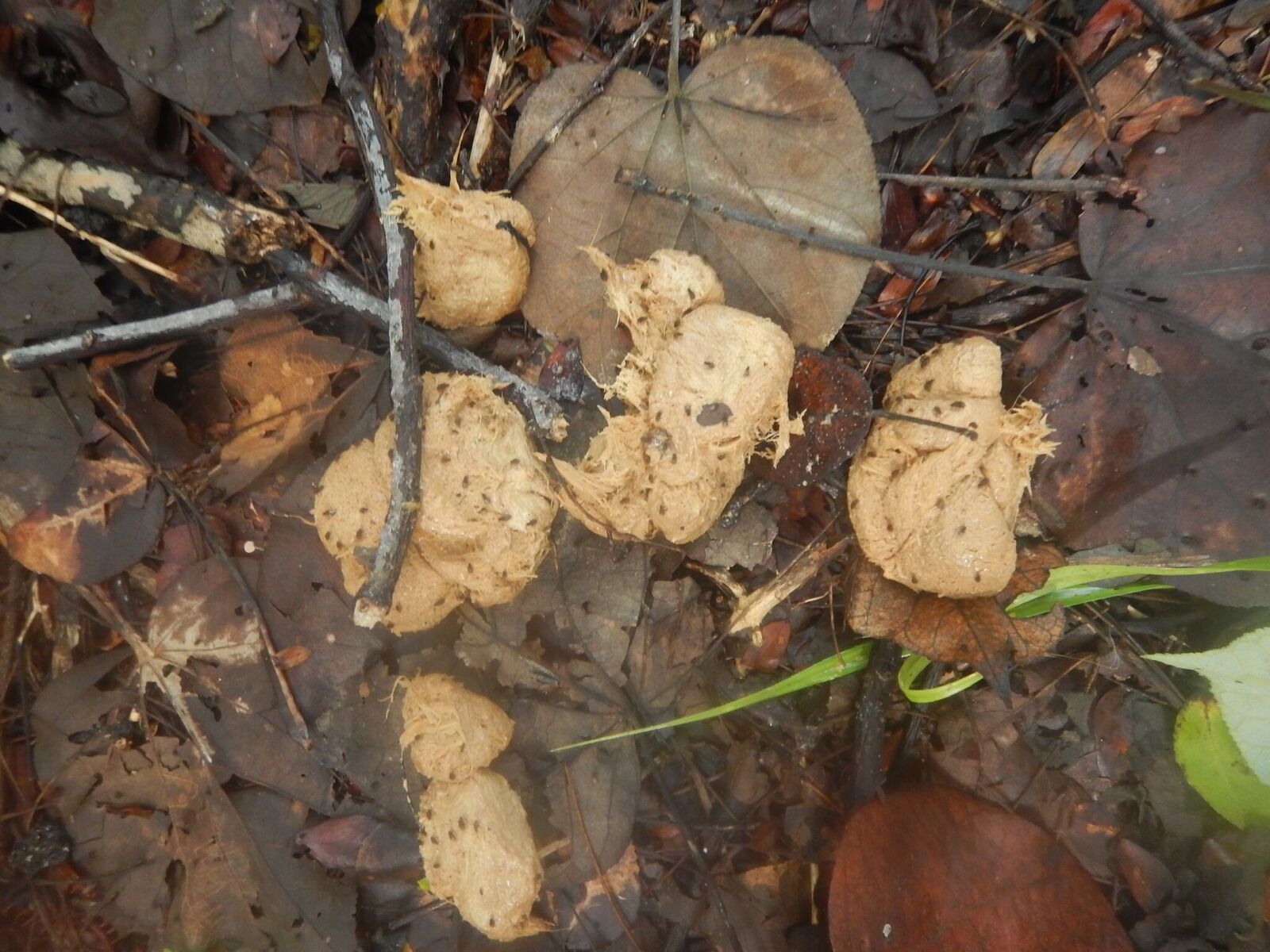
After 10 hours of searching, the orangutan was finally spotted in a small patch of mangrove forest. No wanting to lose her again, Orangutan Foundation’s vet had a dart gun ready.
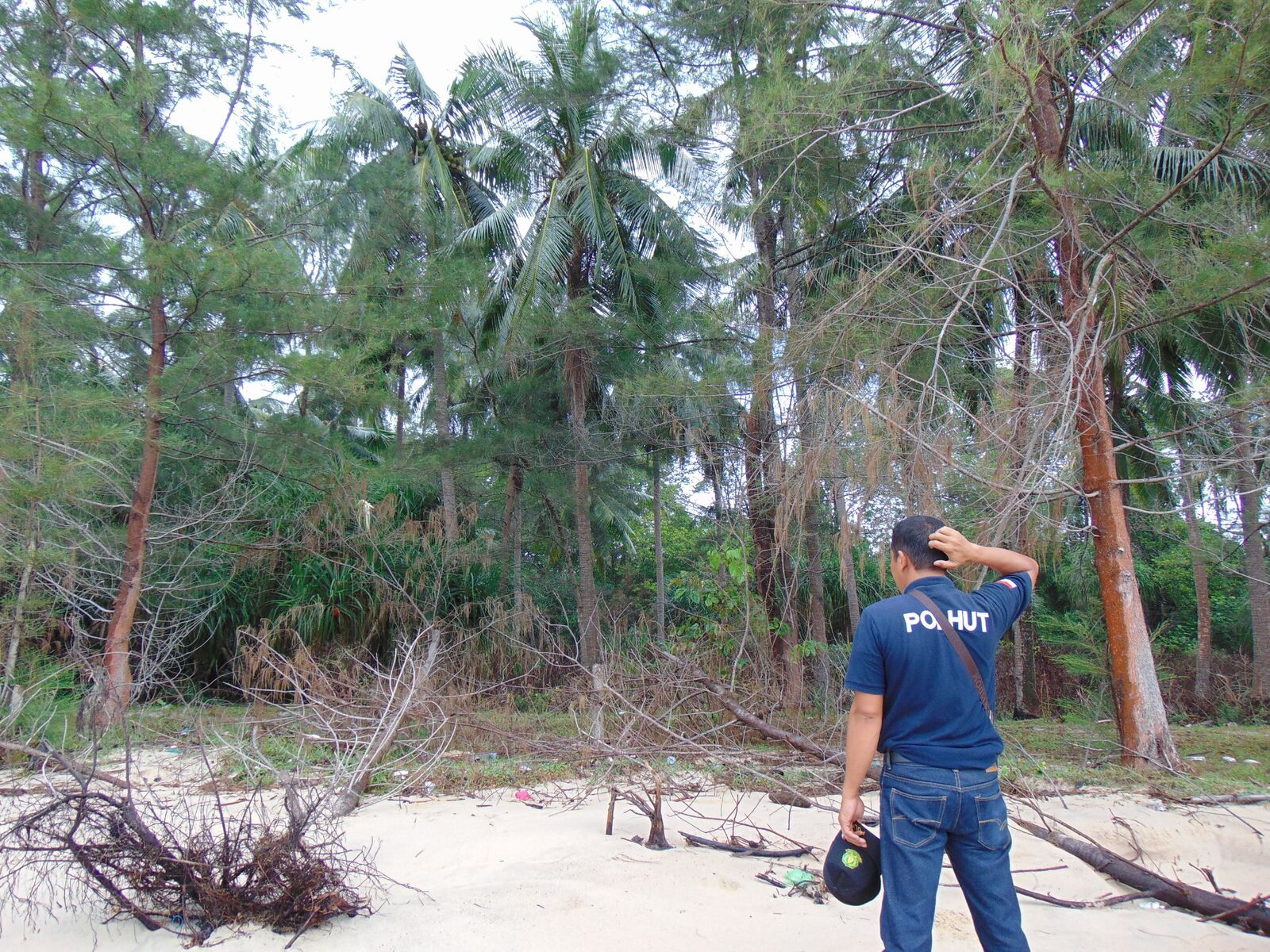
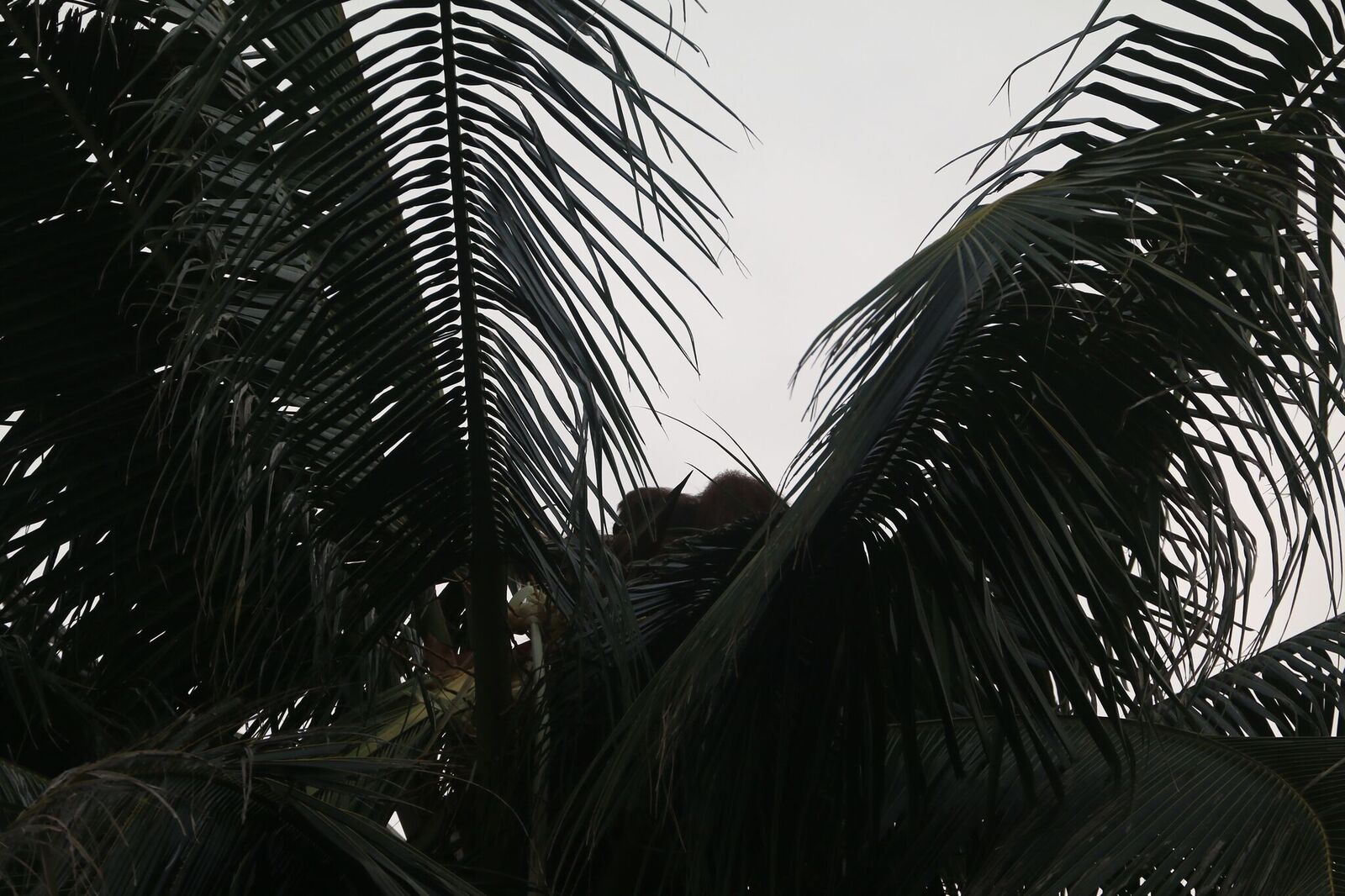
The orangutan was successfully darted, caught and then quickly examined by the vet for injuries.
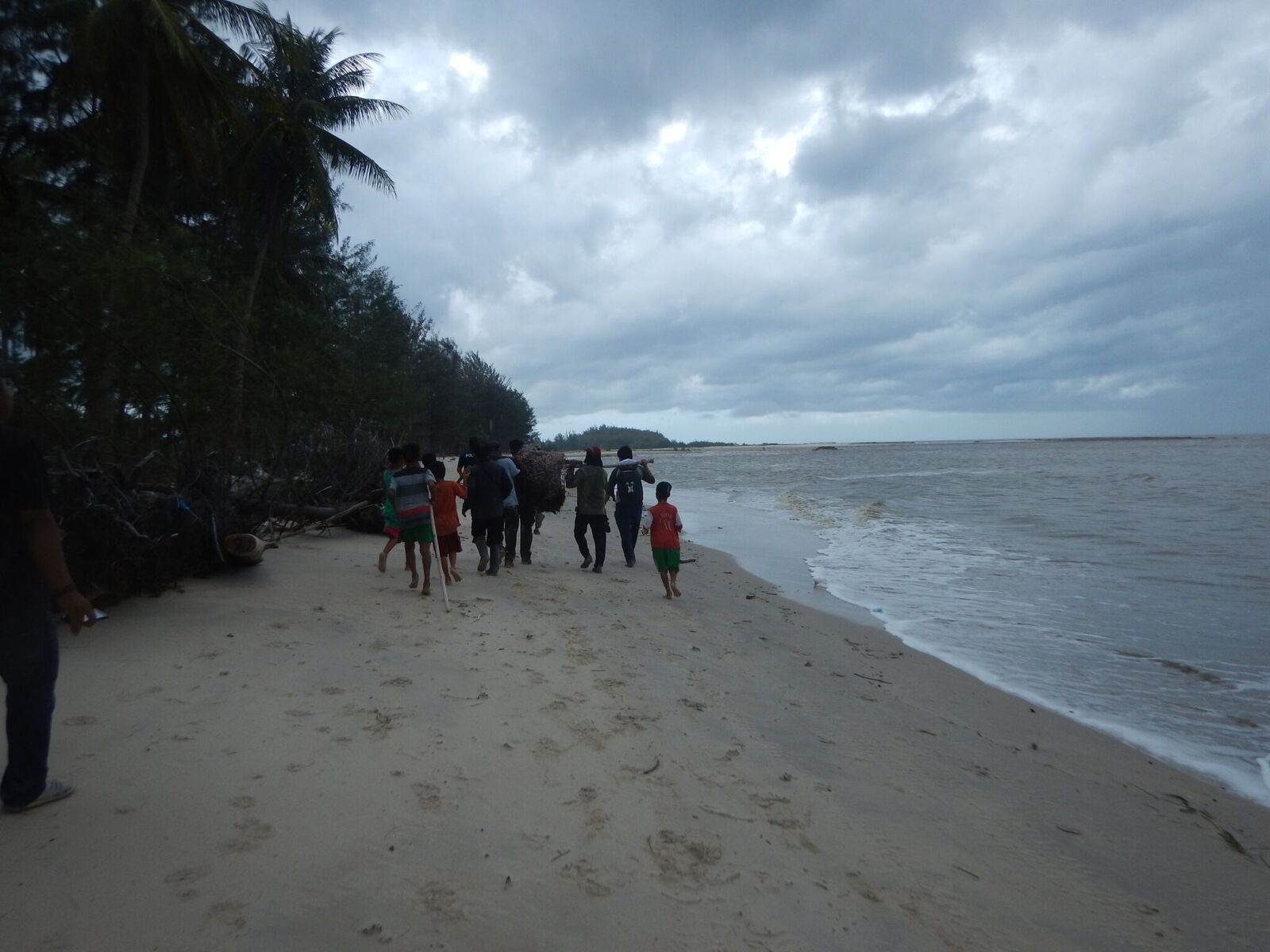
Our vet gave her another examination and confirmed she was female, healthy and in a fit condition. He gave her vitamins and worming medicine and blood samples were taken.

She was then transferred into a holding cage, for the long drive back to Pangkalan Bun, to the Wildlife Department’s head office.
Bornean orangutans are critically endangered due to the destruction and fragmentation of tropical forests. As they lose their forest home they are forced into contact with humans, often resulting in injury or death for the great ape.
We have rescued many orangutans, but this is the first time an orangutan has been rescued from a nearby beach. Luckily, for this orangutan, she was taken by boat to the protected Lamandau Wildlife Reserve. As soon as the cage door was opened she clambered straight up the nearest tree and disappeared into the forest canopy.
The wildlife reserve, is home to an estimated 500 orangutans, and the Orangutan Foundation actively protects it with guard posts, forest patrols and conservation drones.
Please donate now to support our work.
Have your donation doubled for free and support Borneo's wildlife conservationists
From 28th November until 5th December you can DOUBLE your donation through the Big Give Christmas Challenge, at no extra cost to yourself. Click here to donate and double your impact to support our work. This year our we are raising funds to inspire Borneo’s future conservationists. In this clip Arie, Research Manager of Pondok Ambung, our tropical forest research station in Tanjung Puting National Park, explains why it is important.
We use camera traps to monitor the wildlife in the forests surrounding Pondok Ambung. Watch this short clip to see some of the species we’ve managed to capture on film!
To protect Indonesia’s biodiversity, future conservationists need to be encouraged and supported.
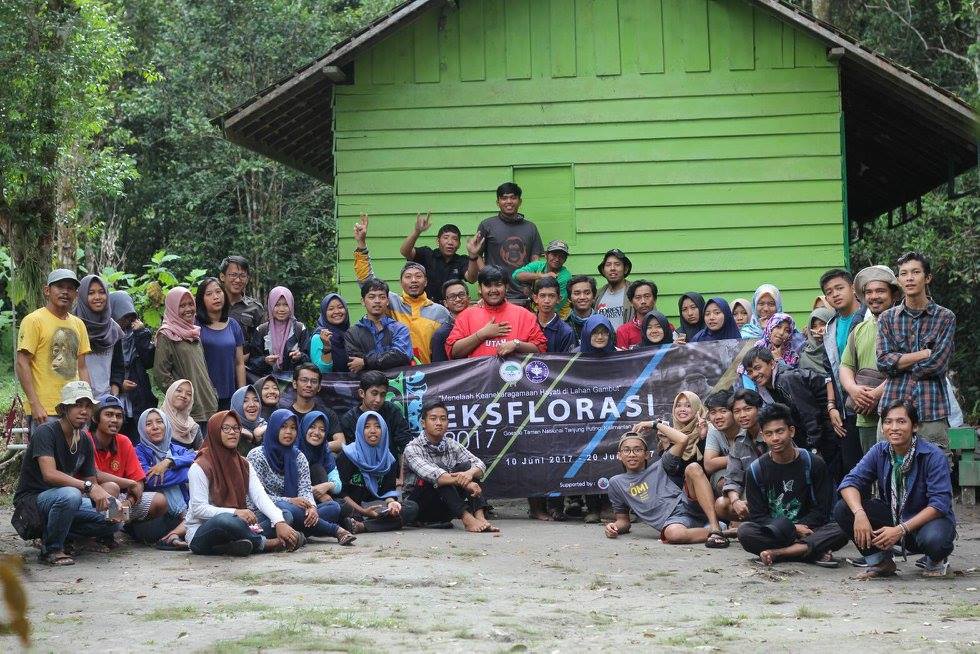
Our research station is a base from where Indonesian students and international scientists can conduct research. Take a virtual tour below:
Please help us to ensure a future for orangutans, forests and people.
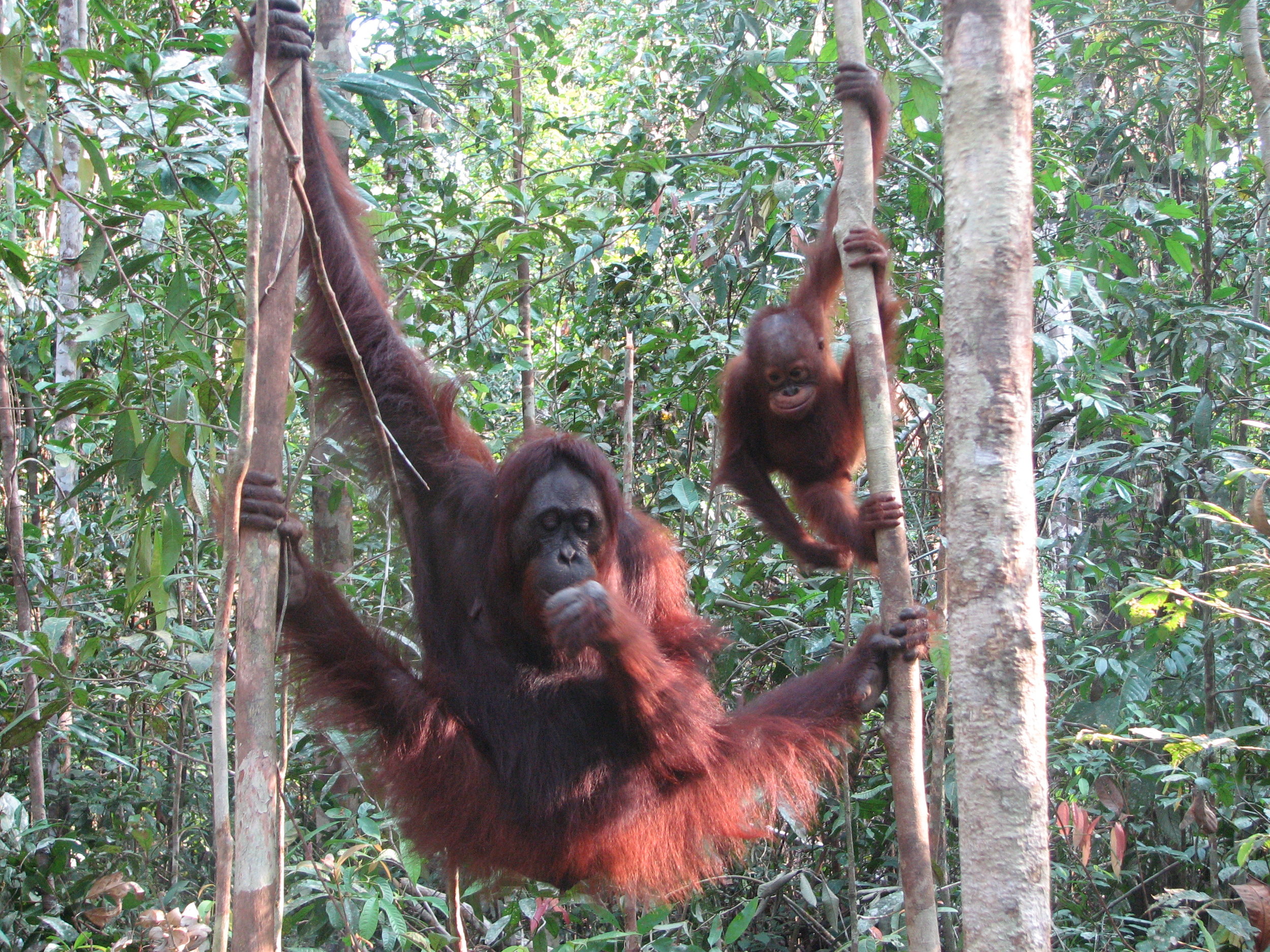
Thank you for your support. Click here to DOUBLE YOUR DONATION through the BIG GIVE.
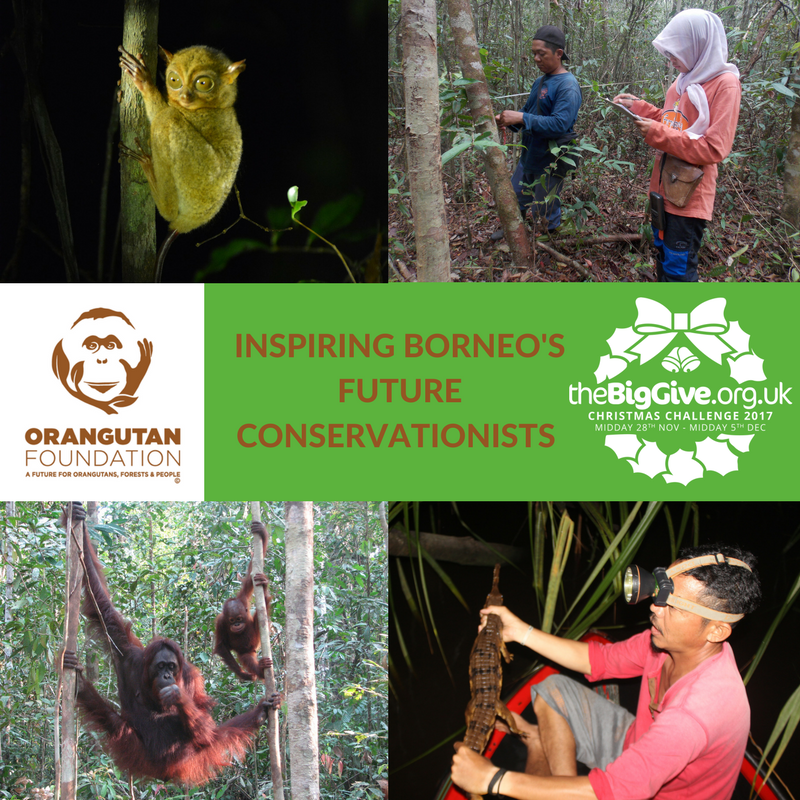
An interview with Jakir - Patrol Manager, Orangutan Foundation
To finish off Orangutan Awareness Week, our final blog post is about Jakir, who oversees the protection of the Lamandau Wildlife Reserve and its precious inhabitants. He has been in this role for 10 years. Jakir is also a talented photographer and many of his images have been included in our new photobook, The Orangutan's World. Our committed Indonesian staff are the bedrock of all we do. Please donate to support our vital work, keeping forests standing and orangutans in the wild.
Jakir, Patrol Manager Orangutan Foundation
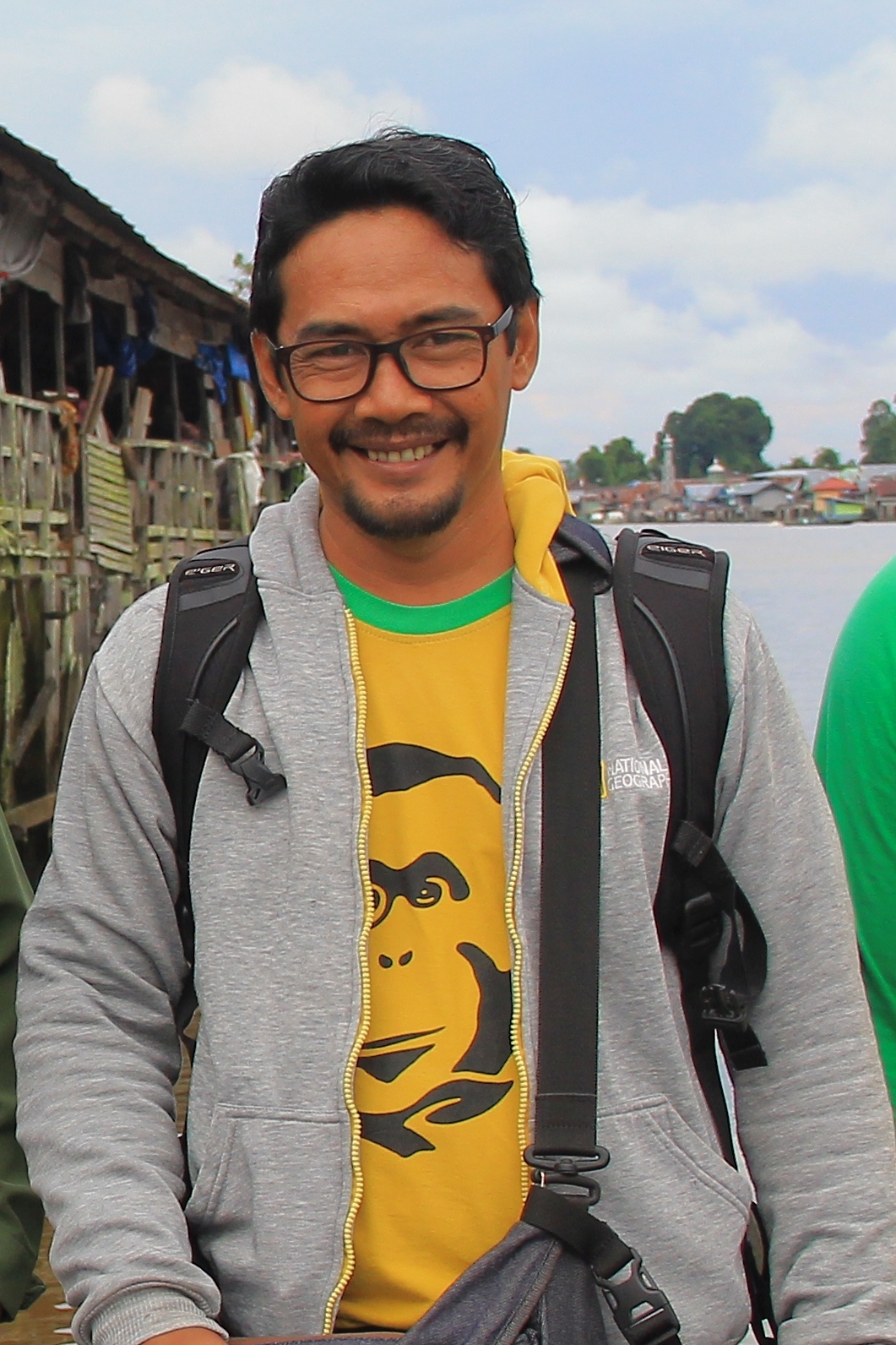
My role as Patrol Manager is to supervise the 12 staff who occupy our eight guard posts, ensuring that they are well maintained and operated, so that the wildlife reserves are protected from illegal activities, such as logging, mining, hunting and fishing.
It’s a very important role and I most of all I love the interaction with the local community in the field. Sometimes ignorance is the reason for illegal activities, and we tell people what we are doing so they also understand why we are protecting the forest.
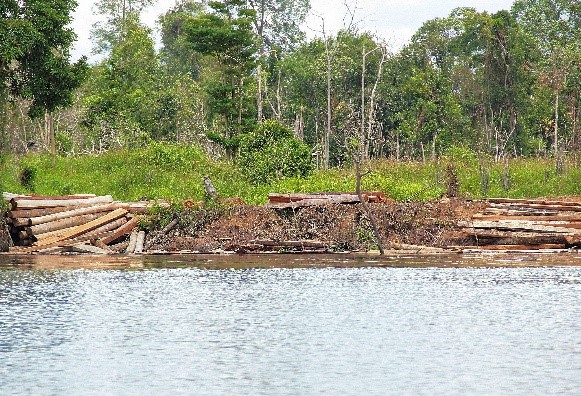
But the biggest challenge is facing people who deliberately do illegal activities. We have faced threats and bribes, but some people who were previously involved in illegal forestry now give us information on illegal activities they encounter.
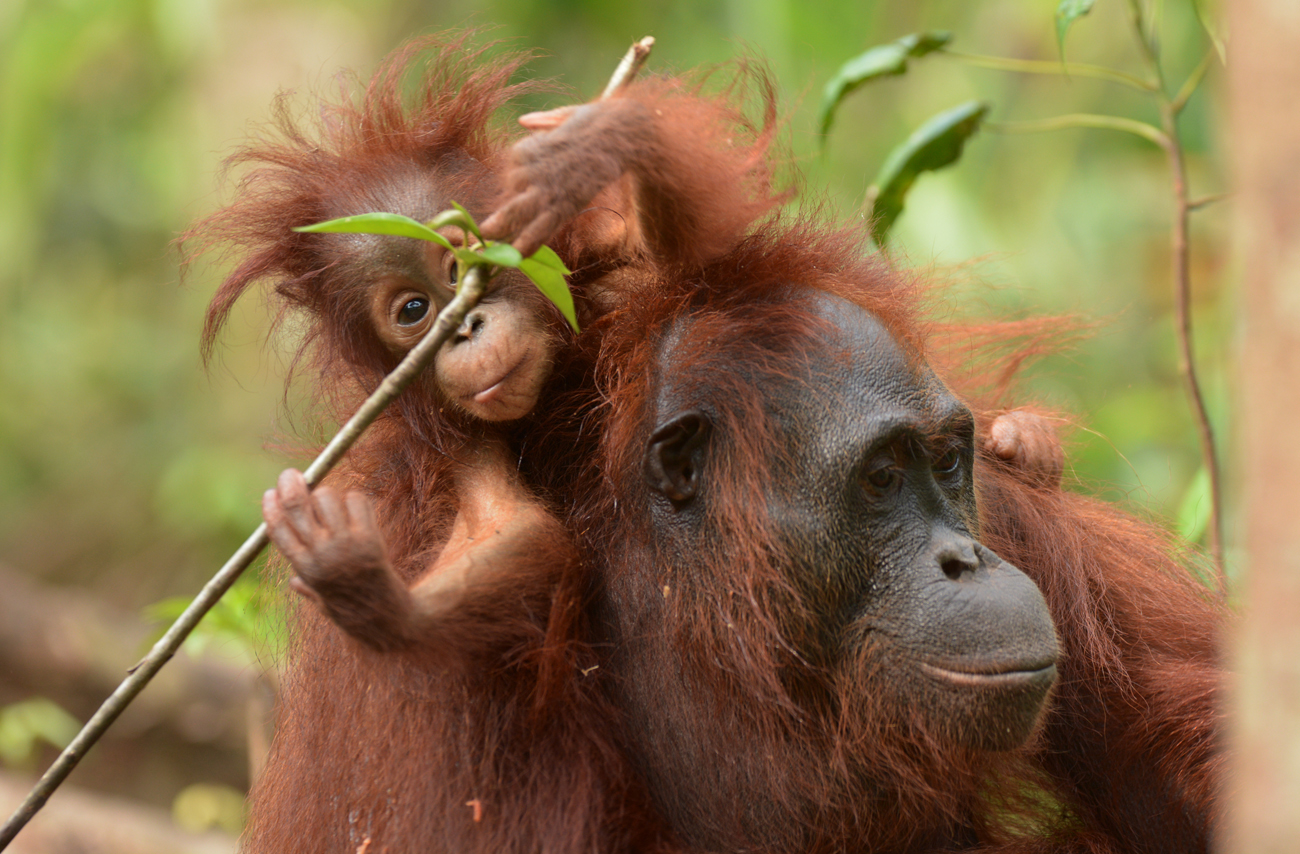
It’s very special to see some of the animals that we have saved roaming free in the forest in Lamandau.

When I first met Ashley, the Director of the Orangutan Foundation, I didn’t understand why she talked so much about protecting the forest and sacrificed so much of her own time for this. But a long time afterwards I saw some villages submerged by flooding and I realised why protecting the forest is so important.
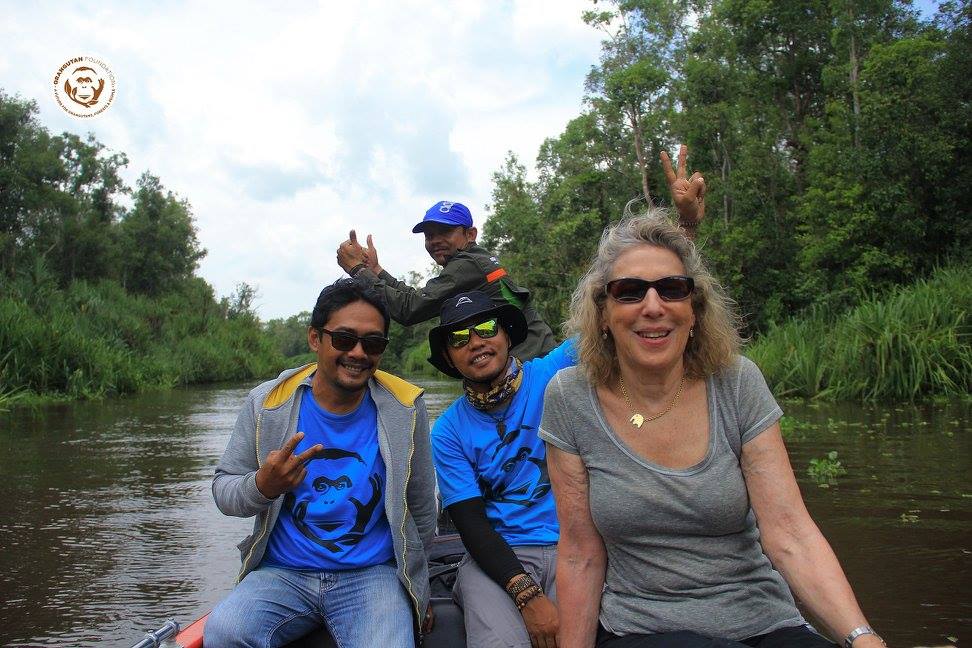
My hope is that the forest will always be alive and awake, so that my grandchildren can see and feel the coolness of this forest.
Written by Anna Levin, this interview was featured in our latest member's newsletter, Red Ape, Autumn 2017.
By donating £16.50 a month you can become a Guardian of the Lamandau Wildlife Reserve and support the protection of over 150,000 acres of tropical forest habitat. Click here to find out more.
Meet Aan the orangutan
To celebrate Orangutan Awareness Week, we are telling the stories of some of the orangutans who have been given a second chance thanks to your support for our work, but unfortunately, not all have a second chance in the wild. Aan
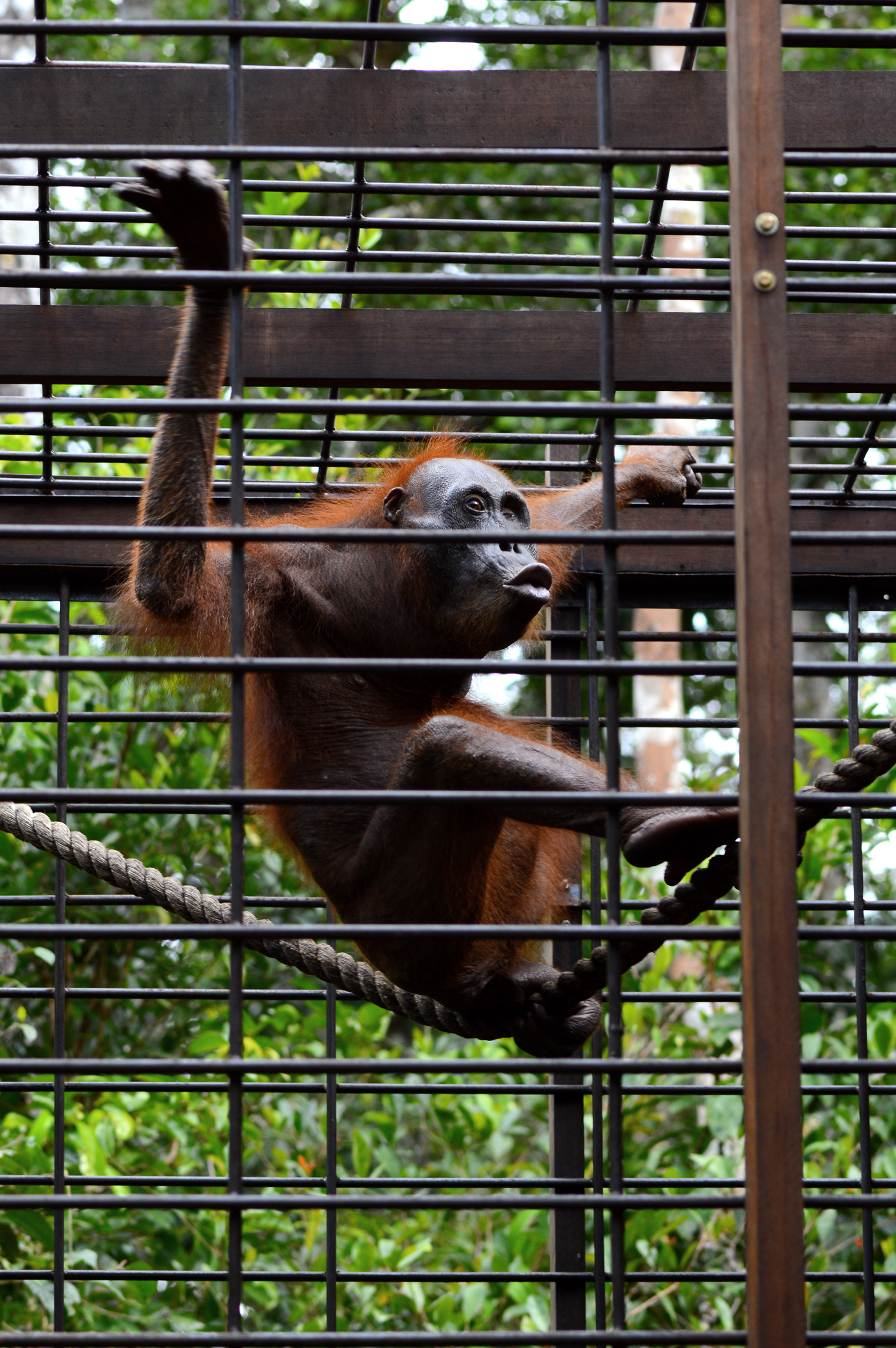
Aan is a blind orangutan. She first came to us in 2012, having been found stranded on an oil-palm plantation, after being shot over 100 times with an air gun. The injuries sustained left Aan blind. You can read more about her rescue here.

In 2016, we arranged for an ophthalmic surgeon to visit Aan to see if there was any chance of restoring her sight, with the hope that one day she could return to the wild. Aan underwent surgery but it soon became clear that the damage sustained was too severe and Aan would be permanantly blind.

Aan lives in a purpose-built enclosure at Camp Gemini, where our vet clinic is located, in the Lamandau Wildlife Reserve. Our staff give her the best quality of life that is possible, but sadly Aan can never return to the forest, where she belongs.
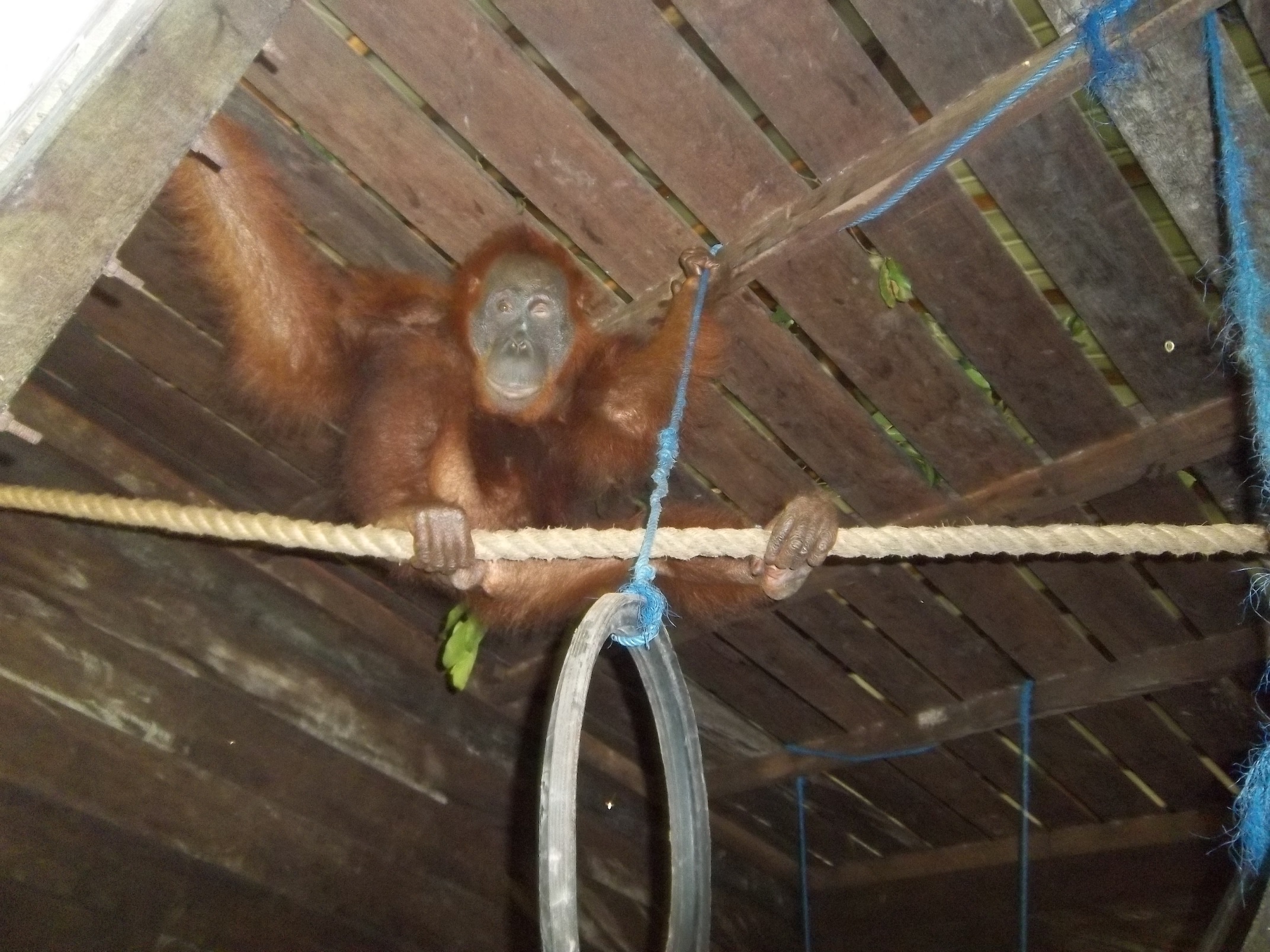
Aan’s story serves as a heartbreaking reminder that the threat to orangutans caused by habitat loss is a very real one. Please support our care of Aan during Orangutan Awareness Week by donating here.
Meet Kotim the orangutan
It is Orangutan Awareness Week and each day we will bring you a story about the orangutans in the Lamandau Wildlife Reserve. Thanks to your support we are protecting their forest home the Lamandau Wildlife Reserve and keeping them wild and free. Kotim
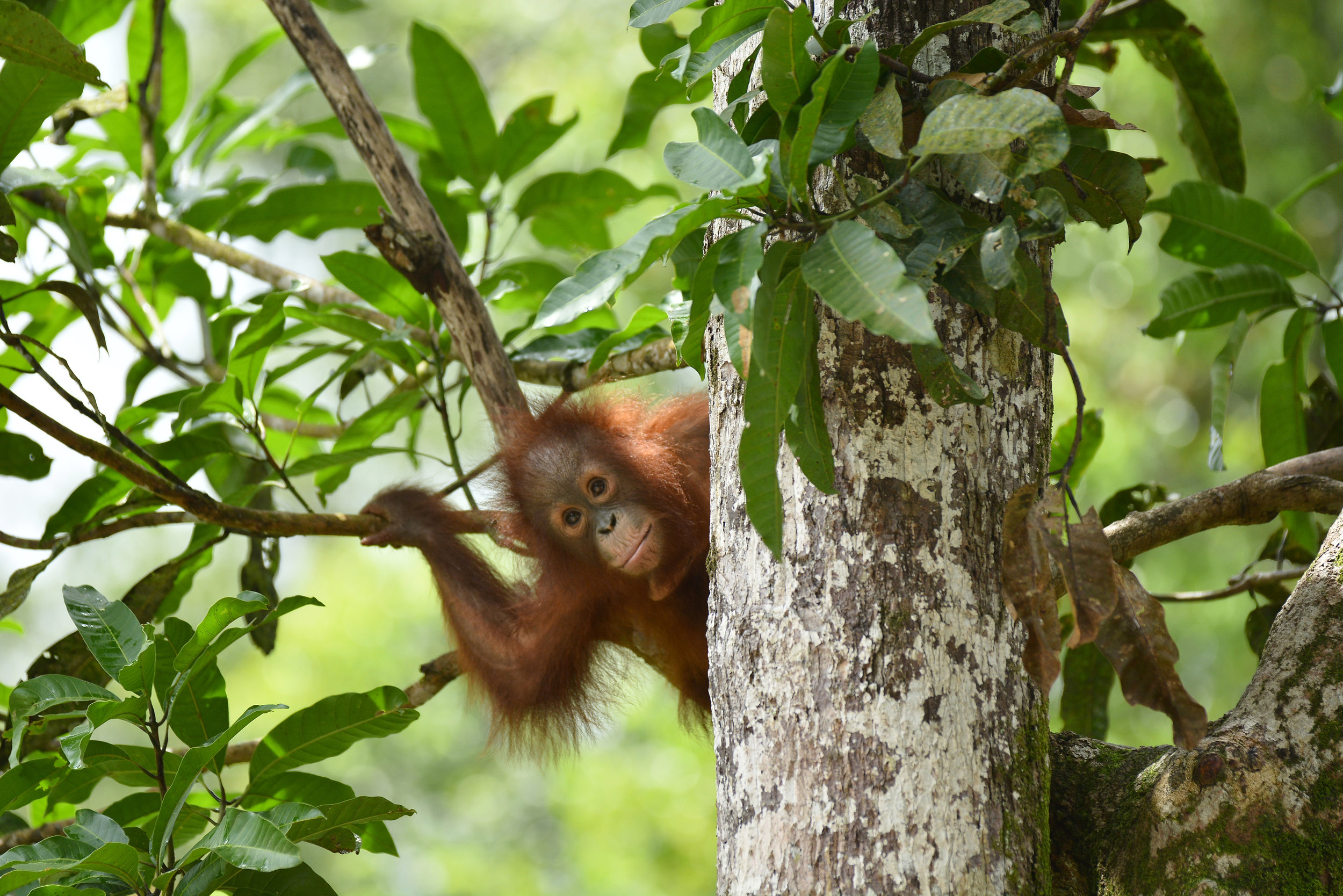
Kotim was rescued in 2014. She was handed over to Orangutan Foundation after being illegally kept as pet. Sadly, we can only assume that her mother was killed.
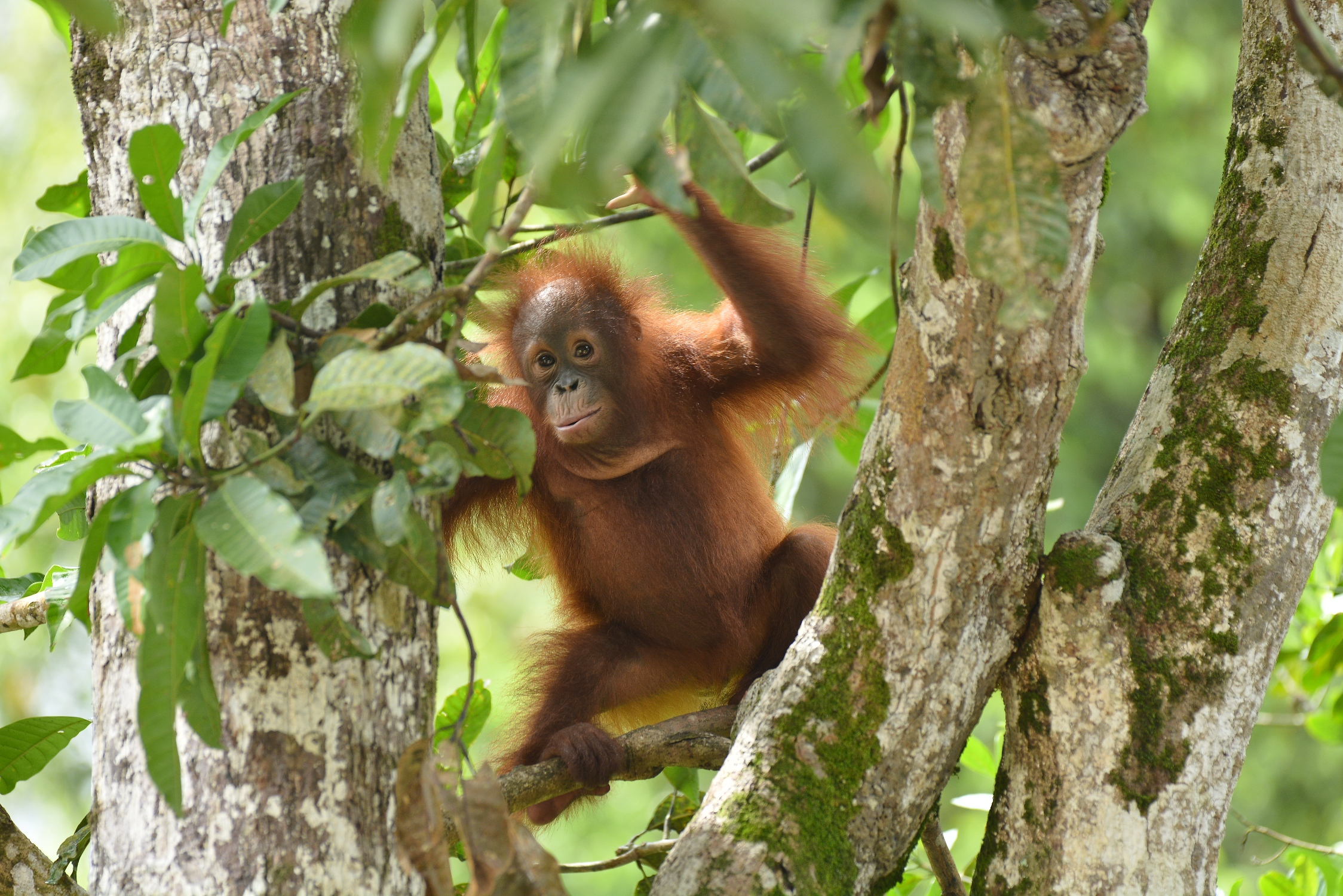
At three-years-old Kotim was too young to be released back into the wild and so entered into the care of our Soft-Release Programme, at Camp Rasak in the Lamandau Wildlife Reserve, Indonesian Borneo. Kotim joined another infant orphan, Torup. They became playmates and together practised their nest-building and climbing skills.
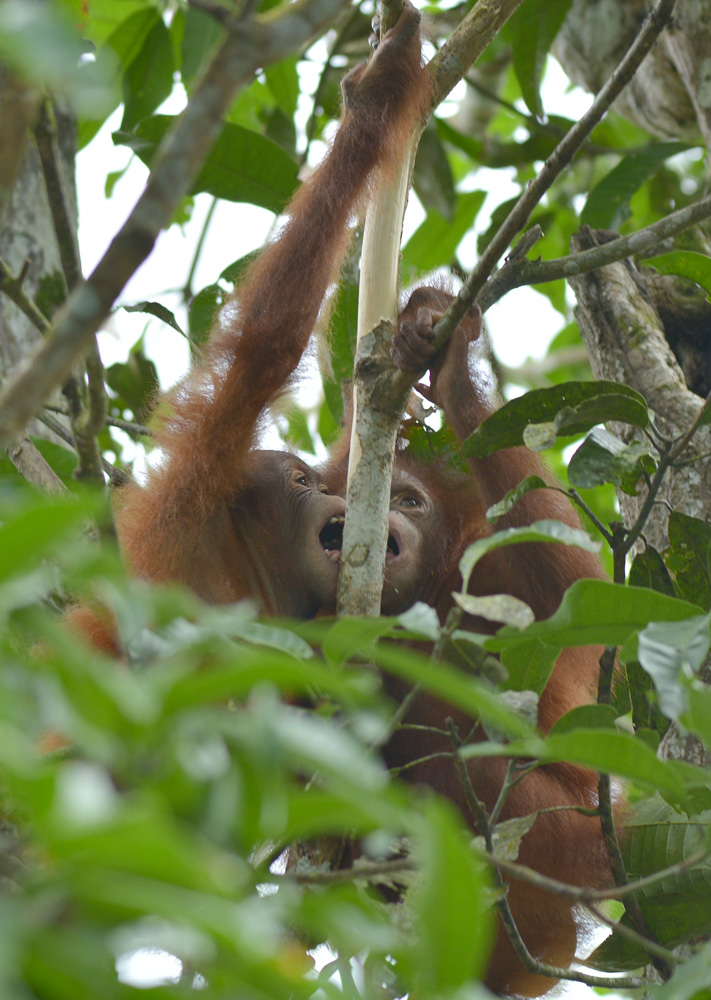
By April 2016, Kotim was deemed to have all the skills needed to survive in the forest and was successfully released. She is still occasionally seen by Orangutan Foundation staff. In December 2016, Kotim was seen with adult female orangutan Acuy and her infant, Ariel.
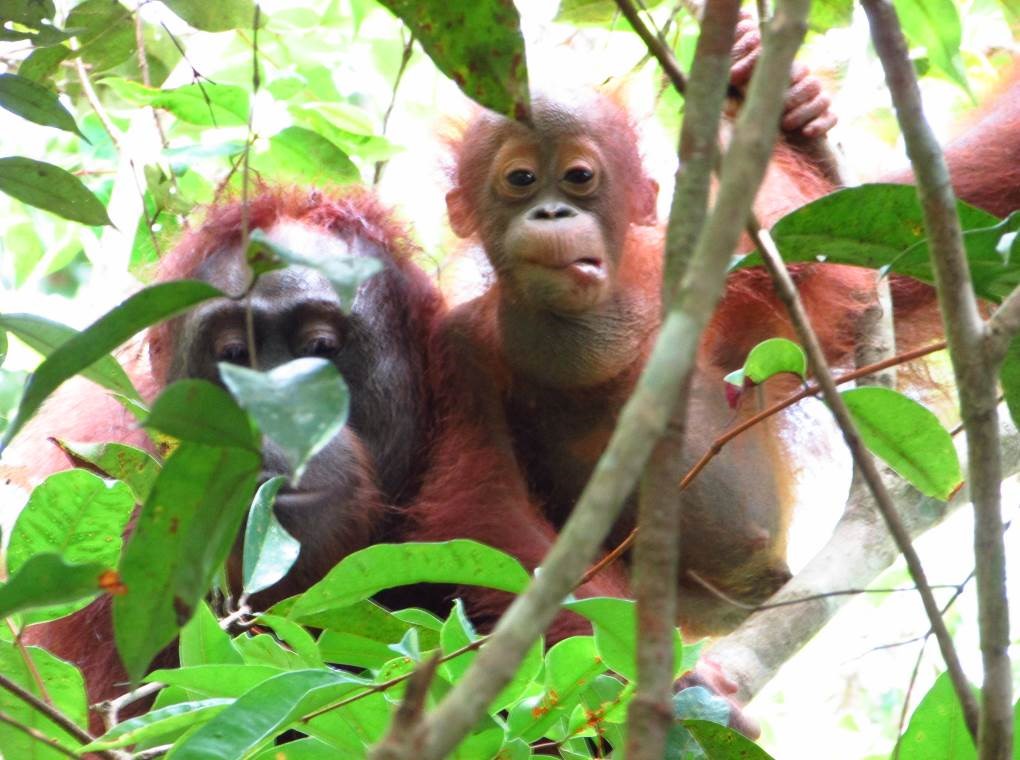
Support Kotim during Orangutan Awareness Week. Please donate to help us protect her tropical forest home. Keep forests standing and orangutans in the wild.
Please donate here.
Here's a video of Kotim whilst under our care in our Soft-Release Programme:


